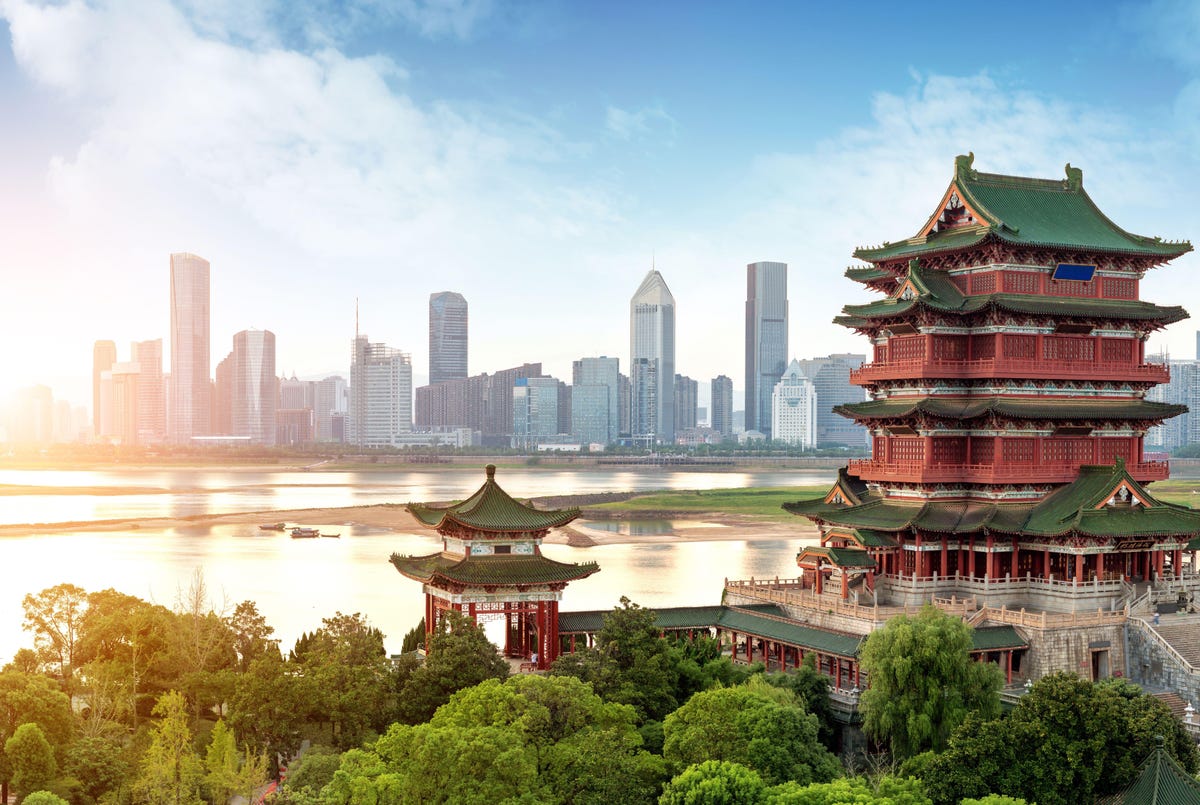
-
'The politics of pure business': Western media groups cooperate with China's official news agency Xinhua for being allowed to operate in the country. It's time for them to wake up.
chinamediaproject.org The Politics of Pure Business - China Media ProjectAs Western media groups talk of “purely commercial” cooperation, China’s official Xinhua News Agency regards its partnerships as part of China's broader effort to shape global discourse and promote its government image. It's time for professional media groups to wake up.

cross-posted from: https://feddit.org/post/459808
> Archived link > > “What [authoritarian] regimes have in common is their fear of a well-informed public,” Christoph Jumpelt, the head of the international relations unit at Germany’s public broadcaster, Deutsche Welle, said this week in Taiwan. > > International media groups like AP, Reuters and PA Media Group cooperate with China's state-controlled agency Xinhua for being able to operate within the country. It should be obvious that such a conditionality has no place in what they say is a “purely commercial” arrangement, not in the least as this does a huge injustice to the thousands of journalists who struggle each day to report the facts. > > - Last month Fu Hua, President of China’s official Xinhua News Agency, which sits directly under the country’s State Council, made a whirlwind tour from New York to London, meeting with top executives from AP, Reuters, and PA Media Group, to foster long-standing business relationships. > > - Such deals with Xinhua should invite tougher questions about how international media companies with a stated commitment to professional standards should deal with Chinese media giants whose sole commitment — crystal clear in the country’s domestic political discourse— is to strengthen the global impact of Party-state propaganda. > > - Xinhua's Fu is not a champion of independent media values, or a partner in tackling the information challenges of the future. Prior to his role at Xinhua, Fu served as a deputy minister of the Chinese Communist Party’s Central Propaganda Department. His agenda is that of China’s ruling Chinese Communist Party, the CCP. Plain and simple. > > - The partnerships with Western media are part of a broader effort by Xinhua to deepen its global media influence, curtailing criticism of the Chinese government and shaping international discourse that portrays the CCP in a positive light. And yet, year in and year out, Western media executives insist, even against the substance of their own statements, that this type of cooperation is just normal business. > > - If it is true, for example, that AP “publishes none of the stories" by Xinhua as it claims, what then is the point of such empty formalities? “Like most major news agencies,” said a former agency head, “AP has an agreement with state-run media in China that allows AP to operate inside the country.” > > - And there we have the crux. AP’s relationship with Xinhua, in place since 1972, forms the political foundation on which AP and other major news agencies, including Reuters, are able to operate in China. > > - It should be obvious such conditionality has no place in any “purely commercial” arrangement. And as they obscure the true nature of the arrangement, news outlets do a huge injustice to the thousands of journalists who struggle each day to report the facts. > > - Western outlets that claim to uphold professional values need to decide where they stand while insisting on the charade of standing with Xinhua, shaking hands and signing on the dotted line.
-
China’s plastics boom set to create another source of trade tensions as the country's petrochemicals sector keeps expanding despite weaker demand
www.straitstimes.com China’s plastics boom set to create another source of trade tensionsPlants have mushroomed along the country’s eastern coast over the last decade. Read more at straitstimes.com.
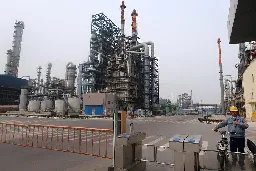
Original version behind a subscription
A surge of Chinese plastic supply is threatening to overflow in the face of weak domestic demand, morphing into a fresh trade challenge for the rest of the world.
“Everyone in China has this notion that if they are fast enough, if they are the first in the industry, able to burn cash long enough, then they will become the survivor that takes market share. And then they can raise the price,” said Ms Vivien Zheng, Asia chemicals analyst with Bloomberg Intelligence.
-
Plants have mushroomed along the country’s eastern coast over the last decade, built in a race to satisfy China’s hunger for plastic and to help refiners counter an expected downturn in transport fuels, as electric vehicles take off. Vast volumes and lacklustre post-pandemic demand mean margins are paper thin – but companies have kept producing, hoping to cling to existing market share.
-
“This is yet another example – after steel and solar panels – where China’s structural imbalances are clearly spilling over into global markets,” one expert for Chinese industries said. In an echo of its predicament from batteries to green-energy technology, the world’s second-largest economy is staring down a situation of dramatic industrial excess.
-
Factories currently navigate the supply surge with brief shutdowns and low run rates, but as production capacity continues to be added, petrochemical executives and sector analysts say surpluses will grow – enough in many products to turn China into a significant exporter, often selling into a glut and potentially exacerbating existing trade tensions.
-
“China’s substantial investments between 2020 and 2027 have reshaped global supply dynamics, leading to a structural surplus in Asia and persistent low or negative profit margins,” said Ms Kelly Cui, principal petrochemicals analyst at Wood Mackenzie. The consultancy estimates that almost a quarter of global ethylene capacity is at risk of closure, even as China is still adding more.
-
Between 2019 and the end of 2024, China will have completed construction of so many plants to turn crude oil and gas into products such as ethylene and propylene – materials behind everything from plastic bottles to machinery – that nameplate capacity is now equal to Europe, Japan and South Korea combined, according to the International Energy Agency (IEA).
-
Part of the reason is that smaller plants do not require approvals from Beijing, as large refineries do. The local authorities were quick to see the opportunity to use cheap land and fiscal perks to encourage job creation and investment. All sought to feed demand for a plastic known as polypropylene, used for plastic packaging, automobile parts and electrical appliances.
-
But as supply flowed, domestic demand faltered. Now the trouble is that financial and market-share pressures are also adding up.
-
China is already a net exporter of polyester products such as PVC and PET, used in clothing or food containers, shipping them to countries like Nigeria, Vietnam and India, according to an expert, again creating or worsening trade surpluses.
-
Most of the new facilities in China were installed in the last three or five years despite slowing demand, which makes this economic development harder and harder to sustain.
-
-
Taiwan says China’s coast guard has detained a Taiwanese fishing vessel with six crew onboard and demands its release
apnews.com Taiwan says China's coast guard has detained a Taiwanese fishing vessel and demands its releaseTaiwan says that China’s coast guard has boarded a Taiwanese fishing boat and steered it to a port in mainland China.

Taiwan said the Chinese coast guard boarded a Taiwanese fishing boat Tuesday before steering it to a port in mainland China, and demanded that Beijing release the vessel.
The Tachinman 88 was intercepted by two Chinese vessels Tuesday evening near the Kinmen archipelago, which lies a short distance off China’s coast but is controlled by Taiwan, Taiwanese maritime authorities said in a statement.
Taiwan dispatched three vessels to rescue the Tachinman 88, but the one that got close to the fishing boat were blocked by three Chinese boats and told not to interfere, the statement said. The pursuit was called off to avoid escalating the conflict after Taiwan’s maritime authorities detected that four more Chinese vessels were moving closer, the statement added.
“The Coast Guard calls on the mainland to refrain from engaging in political manipulation and harming cross-strait relations, and to release the Tachinman ship and crew as soon as possible,” the statement read.
The boat had six crew onboard, including the captain and five migrant workers, according to Taiwan’s official Central News Agency. The vessel was just over 20 kilometers (12 miles) away from Jinjiang in mainland China when it was boarded, Taiwanese authorities said.
China claims self-governing Taiwan as its territory and says the island must come under its control. The Chinese military regularly sends warplanes and ships toward the island and staged a large exercise with dozens of aircraft and vessels in May.
Fishermen from both Taiwan and China regularly sail the stretch of water near the Kinmen archipelago, which has seen a rise in tensions as the number of Chinese vessels — including sand dredgers and fishing boats — have notably increased in the area.
In February, two Chinese fishermen were drowned while being chased by Taiwan’s Coast Guard off the coast of Kinmen, prompting Beijing to step up patrols in the waters.
-
Forced relocation in Tibet: the downside of China’s poverty reduction strategy
iari.site Forced relocation in Tibet: the downside of China’s poverty reduction strategy -As a result of China's relocation programs, Tibetans' cultural identity is at risk, but according to the Chinese government, these programs are imperative to eradicating poverty. PCC's strategy, however, should be cautious if Xi wants to prevent a "quarrel" with his neighbors

Over the past 40 years, the Chinese government has carried out several programs to reduce and eliminate extreme poverty in the Country. On 25 February 2021, the National media announced that extreme poverty had been almost eliminated in China.
There were, however, many human rights issues that came up along the way. And many even argue some measures of China's poverty reduction strategy should rather be viewed as a way to gain leverage in its border disputes with its neighbors.
-
The Targeted Poverty Alleviation (TPA) program was officially implemented in 2015, it was structured to follow the whole process: from poverty identification to poverty exit.
-
TPA developed five core methods to lift the poor out of poverty: industry, relocation, ecological compensation, education, and social assistance. Despite its innovative approach to eradicating extreme poverty, TPA methods have some harsh side effects, especially for ethnic minorities.
-
the relocation strategy is not new to the Chinese government. However, after launching the TPA, it was mainly directed toward regions where most people belong to China’s ethnic minorities. Tibet is one of the regions where the mass relocation programs are more controversial, mainly because of the numerous human rights violations perpetrated by China’s government against Tibetans since the creation of the Tibet Autonomous Region (TAR) in 1951.
-
the PRC is carrying out a “Sinicization” campaign whose objective is to eradicate any trace of Tibetans’ autonomy’s desire. Mass relocation programs are part of this strategy, even if the government maintains that it is the most effective strategy to reduce poverty and, at the same time, to stop environmental degradation.
-
Tibetans are moved to locations where they cannot continue their former livelihoods or lifestyles. Often, for example, herders are moved to farming areas and farmers are moved to urban areas where they will be entering the labor market without the experience to do so. Part of the TPA indeed is to provide relocated people with initial subsidies and social assistance to facilitate their adjustment to new lifestyles, but for what concerns Tibetan herders, this kind of assistance is not enough.
-
If Tibetans do not agree to relocate, authorities are allowed to exert different forms of pressure that range from intrusive home visits to implicit threats. After the relocation, the Chinese government demolishes their former homes once they have been relocated to prevent them from coming back. The UN Basic Principles and Guidelines on Development-based Evictions and Displacement provides that states should, when circumstances allow, prioritize the rights of restitution and return.
-
In recent years, the relocation of Tibetans has been accurately directed towards villages along the contested territories between China and its neighbors. It involved building 628 border villages called “well-off border defense villages” which were selected for their remote location, very sparse population, and poor conditions.
-
For China’s government, these villages have multiple objectives: reduce the poverty rate in the country, and keep an eye on the movements of populations and activities across the border. Moreover, the location of these villages, and the development of bridges and railway lines in the same regions, should be viewed as a way to gain leverage in its border disputes with its neighbors.
-
China is particularly concerned about one of its neighbors: India. Although trade between the two nuclear powers surpassed $136 billion in 2023, relations between Beijing and New Delhi remain tense. China reclaims large parts of Indian territory, including the entire state of Arunachal Pradesh which was recently renamed “Southern Tibet” by China’s government.
-
The response of the newly elected National Democratic Alliance (NDA) government, led by Prime Minister Narendra Modi, was the renaming of 30 places in Tibet, signaling its willingness to confront China, at least theoretically. Indian and Chinese troops stationed along the border regularly engage in conflict, sometimes resulting in casualties.
-
As China focuses more on border defense and security in Tibet, the situation between India and China at the borders is likely to escalate and possibly result in more clashes. China is investing heavily and strategically in border-related infrastructure and in relocating and re-educating residents. The Indian Government may follow suit and bolster its borders by investing more, securing them, and ensuring their safety.
-
For India, the Himalayan problem is a bilateral affair, but recently Modi seems more willing to let China know that he is looking for new allies. Modi thanked Lai Ching-te, the newly elected President of Taiwan, for his message of congratulations after being re-elected. Nevertheless, the Taiwan-India relationship remains unofficial, and their political connections seem to be directed at deepening economic cooperation.
-
-
Taiwan raises travel alert for Mainland China, Hong Kong, Macau over Beijing's new judicial guidelines introducing death penalty for supporters of Taiwanese independence
www.jurist.org Taiwan advises people to avoid travelling to Mainland China, Hong Kong and MacauTaiwan Mainland Affairs Council on Thursday raised the travel alert for Mainland China, Hong Kong and Macau to 'orange' level and advised people to avoid non-essential travelling. The Council claimed...
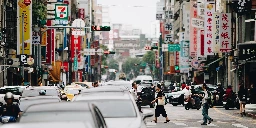
cross-posted from: https://feddit.org/post/380048
> Taiwan's government raised the travel alert for Mainland China, Hong Kong and Macau to “orange” level and advised people to avoid non-essential travelling. The Council claimed that because the Mainland China, Hong Kong and Macau have continued to amend or issue legal documents relating to national security in recent years, there are reported cases in which Taiwanese travelling to mainland China have been subjected to unlawful detention, retention and interrogation, as the Straits Exchange Foundation deputy secretary general Tsai Meng-chun suggested. > > One week ago, China published new judicial guidelines to introduce the death penalty for “particularly serious” cases involving supporters of Taiwanese independence, which included severe punishments for activities deemed as fragmenting the country or inciting secession. According to the Council, this poses a serious threat to the personal safety of Taiwanese travelling to mainland areas. Hence, it strongly recommended that Taiwan people should not enter China mainland, Hong Kong and Macau unless it is necessary, and should avoid discussing sensitive issues, photographing military sites, or carrying books on politics, history and religion.
-
"Unacceptable risks to human life and the environment": China-backed mine in Indonesia rings safety alarms over the potential for its waste dam to collapse in the earthquake-prone region
news.mongabay.com China-backed mine in Sumatran seismic hotspot rings safety alarmsJAKARTA — Protests are mounting in Indonesia against a China-backed zinc and lead mine being developed on the island of Sumatra in defiance of opposition from local communities. On June 11, protesters from communities that would be affected by the mine in Dairi district demonstrated outside the Chin...
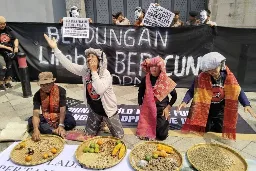
- Communities in Indonesia’s Dairi district continue to protest a zinc and lead mine being developed by a Chinese-backed company.
- They warn the PT Dairi Prima Mineral (DPM) mine poses unacceptable risks to human life and the environment, given the potential for its waste dam to collapse in the earthquake-prone region.
- There are 11 villages located around or downstream of the proposed tailings dam, making the prospect of its collapse potentially disastrous. Some homes and houses of worship lie less than a kilometer (0.6 miles) from the dam, while an entire village of 2,010 people, called Pandiangan, is just 1.8 km (1.1 mi) from the dam.
- This would make the project illegal if it was built in China, since that country’s regulations prohibit the construction of a tailings dam within a kilometer of a populated area, according to Emerman.
- These concerns are borne out in a series of independent analyses of the project’s environmental impact assessment, which experts say fails to live up to the standards the developers claim to follow.
- Despite the questions over the assessment, the Indonesian government has issued environmental approval for the project, which local communities are now challenging at the Supreme Court.
-
Chinese Government Rejects Key Human Rights Recommendations in Latest UN Review
- The Chinese government’s rejection of recommendations to end its deepening human rights crisis reflects its disdain for international human rights reviews at the United Nations, human rights nongovernmental organizations said in a joint statement released on June 25, 2024.
- In a disingenuous effort to paper over its refusal to engage to improve its appalling record made clear by latest Universal Periodical Review (UPR) in January 2024, the Chinese government said it would accept 290 of the 428 recommendations, partially accept 8, note 32, and reject 98 of the recommendations made. The 290 accepted ones include those the government said it “accepted and being implemented” and those “accepted and already implemented.”
- However, none of the “accepted” recommendations address concerns raised by UN member states about crimes against humanity, torture, forced disappearance, persecution of human rights defenders and journalists, or other grave and well-documented violations.
- In this context, the numerous acceptances by the Chinese government does not mean actual intention to improve its rights record. No one should confuse a high number of accepted recommendations with any real commitment by Beijing on human rights.
- Beijing’s responses to UPR recommendations also include hostility towards the process and towards UN human rights mechanisms. The government has challenged the authority of the UPR to address topics Beijing insists are a matter of “sovereignty,” and disparaged the professionalism of UN human rights experts.
- The Chinese government also falsely proclaimed the August 2022 OHCHR report on human rights abuses in Xinjiang, which that office alleged may constitute crimes against humanity, as “completely illegal and void.”
-
Chinese Tech Companies Push Staff To the Limit - Slashdot
JD.com founder Richard Liu warned employees against prioritizing work-life balance during a recent video conference, stating those who "put life first and work second" were not welcome at the company. This stance reflects a broader trend in China's tech sector as executives face slowing growth and increased competition.
Major tech firms, including Alibaba and Tencent, have cut tens of thousands of jobs since 2021. Companies are now seeking younger, cheaper workers and demanding longer hours from existing staff. Pinduoduo, an e-commerce group known for its high productivity and grueling work culture, is seen as a model by some in the industry. In 2021, two Pinduoduo employees died in incidents linked to overwork by colleagues.
Older tech professionals, typically over 35, face the greatest risk of redundancy and struggle to find new positions. Employers often view them as expensive and less flexible due to family responsibilities. A 2023 survey of 2,200 professionals in China's largest cities revealed widespread anxiety about career prospects and work-life balance. Many in the industry report experiencing depression and high stress levels.
-
Top propaganda official faces investigation
chinamediaproject.org Top Propaganda Official Faces InvestigationThe sudden announcement Friday of a corruption probe against Zhang Jianchun marks just the second case in the Xi Jinping era of a senior propaganda official falling from grace.
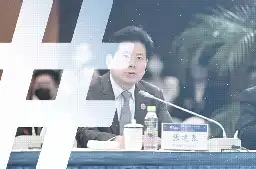
Zhang Jianchun (张建春), a deputy minister at the CCP’s powerful Central Propaganda Department, was accused on Friday of “severe violations of discipline and law” — a signal that a corruption investigation is underway.
[...]
Zhang, 59, had a lengthy career in the CCP’s Organization Department, the body that essentially serves as the human resources heart of the Party, arranging for official appointments and personnel assignments.
[...]
In the wake of the 2022 CCP congress he presided over a gathering of publishing houses to stress the importance of releasing published teaching materials about Xi Jinping’s political report. The month before he had officiated at a gathering of Party-run newspaper publishers, where he blandly emphasized the importance of adhering to the leadership of “comrade Xi Jinping as the core.”
[...]
Prior to the news of his downfall, Zhang Jianchun had not made a public appearance in two months.
- www.nbcnews.com Autocracy is ‘evil,’ Taiwan president says after China threatens death for separatism
Lai Ching-te once again called on China to accept the existence of Taiwan, a self-governing democracy that is claimed by Beijing but where its courts have no jurisdiction.
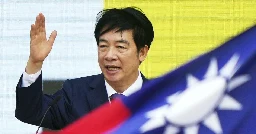
Lai Ching-te once again called on China to accept the existence of Taiwan, a self-governing democracy that is claimed by Beijing but where its courts have no jurisdiction.
Democracy is not a crime and autocracy is the real “evil,” Taiwan President Lai Ching-te said Monday after China threatened to impose the death penalty in extreme cases for “diehard” Taiwan independence separatists.
China, which views Taiwan as its own territory, has made no secret of its dislike of Lai, who took office last month, saying he is a “separatist,” and staged war games shortly after his inauguration.
On Friday, China ramped up its pressure on Taiwan by issuing new legal guidelines to punish those it says support the island’s formal independence, though Chinese courts have no jurisdiction on the democratically governed island.
Asked about China’s move at a news conference at the presidential office in Taipei, Lai first reiterated his sympathy for recent flooding in southern China before responding.
“I want to stress: Democracy is not a crime; it’s autocracy that is the real evil. China has absolutely no right to sanction Taiwan’s people just because of the positions they hold. What’s more, China has no right to go after Taiwan people’s rights across borders,” he said.
According to China, anyone who does not uphold “reunification” is therefore a Taiwan independence supporter, Lai added.
“I also want to call on China to face up to the existence of the Republic of China and have exchanges and dialogue with Taiwan’s democratically elected, legitimate government,” he said, using Taiwan’s formal name. “If this is not done, relations between Taiwan and China will only become more and more estranged.”
Taiwan said that since Thursday, there has been a sharp increase in Chinese military flights as Beijing carried out a “joint combat readiness patrol” near the island.
From Thursday to Sunday, Taiwan says it detected 115 Chinese military aircraft operating nearby, getting as close as 31 nautical miles from the southern tip of the island.
Taiwan has said that for the past four years China has carried out regular military activity around the island as part of a “gray zone” pressure campaign.
Lai rejects Beijing’s sovereignty claims and says only Taiwan’s people can decide their future. He has repeatedly offered talks with China but been rebuffed.
China says any move by Taiwan to declare formal independence would be grounds to attack the island.
The government in Taipei says Taiwan is already an independent country, the Republic of China, and that it does not plan to change that. The Republican government fled to Taiwan in 1949 after losing a civil war against Mao Zedong’s Communists.
Lai also faces domestic challenges, as his Democratic Progressive Party (DPP) lost its majority in parliament in the same election in January that brought him to power.
Speaking at the same news conference, Lai said he would ask the constitutional court to stay a package of contested parliament reforms the opposition has passed and consider whether they comply with the constitution.
The opposition says the reforms, which among other things criminalize contempt of parliament by government officials, are needed to bring more accountability, but the DPP says they were forced through without proper discussion.
-
China’s Spate of Violence Prompts Outburst of Economic Anxiety
- Citizens express concern over downturn as pressures mount
- Flurry of stabbings unusual in country where violence is rare
The reaction of Chinese social media users to a spate of recent violent attacks has exposed widespread discontent about the nation’s downturn, as economic pressures mount.
Shanghai police reported a stabbing Wednesday morning in one of the city’s metro stations, which — like other subway lines in major Chinese cities — has security checks at its entrances. The suspect was detained after injuring three people and the case is under investigation, police said in a statement.
In a country where violence is relatively rare, the incident became a top trending item on social media platform Weibo, garnering some 164 million reads with users speculating on the attacker’s motive. Some suggested the culprit was a stocks investor, a group battered during China’s $7 trillion market meltdown earlier this year.
“The pressure of this economic environment is cascading down to everyone, who may be pushed to the brink by a slight change in circumstances,” one user wrote. “Don’t provoke or bully others; you don’t know where their limits of outbursts are. Don’t let yourself become a victim of the economic climate.”
Another user posted: “When the economy is bad, social problems grow, people are becoming more aggressive.”
Police didn’t provide details of the culprit’s motive, and it was unclear if the attacks represented a surge in such incidents. But the public reaction underscored growing fears over China’s economic downturn, as a slump deepens in the property market where the bulk of household wealth is stored.
“It’s possible the attackers were themselves suffering from the economic slowdown and such anxiety,” said Hanzhang Liu, an assistant professor of political studies at Pitzer College in California. “But it’s even more likely that people are projecting their own anxiety when trying to understand why these incidents happen.”
Protests over the economy, especially the housing crash, have become more frequent and made up 80% of publicly recorded dissent last year, according to Freedom House’s China Dissent Monitor. Almost a third of office workers saw their salaries fall in that period, according to recruitment platform Zhaopin.
The Shanghai incident followed similar reports from across China. Four teachers from a US college were stabbed by a local man in the northeastern city of Jilin last week. The chairperson of a political consultative body in a county in Shanxi was killed at the start of June in a dispute over the cleanup of illegally-occupied state housing. In May, two died in another knife attack in a primary school in the southeastern Jiangxi province.
The Jiangxi attack was viewed more than 390,000 times on Weibo, with one user asking for tougher penalties as “the economy slows down, life becomes more torturing, and crazy people become more frequent.”
While authorities did not provide details of the motives for the Jiangxi and Shanghai attacks, one of the teachers injured in Jilin told Iowa Public Radio that the attacker was “unemployed and down on his luck,” attributing that information to local police.
China has long touted itself as the world’s safest nation. Authorities have rolled out at least four rounds of “strike hard” anti-crime campaigns since the 1980s. The Public Security Ministry said at a press conference in May that social order had been steadily improving over the past five years, with severe violent crime dropping 10.7% in 2023 compared to 2019.
That makes rare outbursts of public violence stand out. People across China were outraged two years ago, for example, when video clips appeared online showing men beating female diners at a barbecue restaurant.
Socially Disadvantaged
Chinese authorities are aware of the link between economic changes and rises in violence. The Guangdong Police College analyzed 140 high-profile cases of violent attacks from 2000 to 2021, concluding last year that most of the culprits didn’t have a prior criminal record.
Instead, China’s rapid economic transformation had put some segments of society at more of a disadvantage, leading them to vent their frustration through violence, according to the research. Due to tight controls of guns and explosives in China, knifing and car-ramming incidents have become more common.
Despite severe crime falling, Chinese authorities listed the prevention of extreme violence as a top priority for law enforcement in a work plan last year. The country is entering a time with a “large amount of social conflict and disputes that are difficult to discover, prevent and handle,” China’s security czar Chen Wenqing stressed in December.
Mental Health Issues
Beijing has even mobilized ordinary people to help stabilize society. Known as the “Fengqiao experience,” that system aims to get local residents to resolve conflicts at the grassroots level to prevent them from spilling over into broader troubles that bubble up to higher level officials.
The ruling Communist Party also created a social work department last year to strengthen its grip on community organizations. The low-key body, which now leads the national ombudsman office, vowed to help better coordinate social relationships and resolve conflicts in an article in March.
Mental health issues that built during China’s three years of Covid isolation, are being compounded by economic pressures including high youth unemployment, said Lynette Ong, professor of political science at the University of Toronto, who’s also a senior fellow at the Asia Society Policy Institute’s Center for China Analysis.
“Acts of random violence could be seen as expression of pent-up social grievances in a high-pressured society,” she added.
-
China's state subsidies in green technologies significantly higher than those in EU and OECD countries, distorting competition, researchers say
www.intereconomics.eu EU Concerns about Chinese Subsidies: What the Evidence SuggestsChina uses subsidies extensively to take a leading role in the global markets of green-tech products such as battery electric vehicles and wind turbines. Against the background of the current EU investigations into Chinese subsidies in these sectors, this article takes a careful look at the Chinese ...

Even by conservative measures, researchers say that China's subsidies green-tech products such as battery electric vehicles and wind turbines is multiple times higher compared to the support granted to countriesin tbe European Union (EU) and the Organisation for Economic Co-operation and Development (OECD).
The researchers conclude that the EU should use its strong bargaining power due to the single market to induce the Chinese government to abandon the most harmful subsidies.
TLDR:
- Quantification of overall Chinese industrial subsidies is difficult due to "China-specific factors”, which include, most notably, below-market land sales, but also below-market credit to state-owned enterprises (SOEs), support through state investment funds, and other subsidies for which there are no official numbers.
- Even when taking a conservative approach and considering only quantifiable factors of these subsidies, public support for Chinese companies to add up to at least €221.3 billion, or 1.73% of GDP in 2019. Relative to GDP, public support is about three times higher in China than in France (0.55%) and about four times higher than in Germany (0.41%) or the United States (0.39%).
- Large industrial firms such as EV maker BYD are offered disproportionately more support. The industrial firms from China received government support equivalent to about 4.5% of their revenues, according to a research report. By far the largest part of this support comes in the form of below-market borrowing.
Regarding electrical vehicles, the researchers write:
> China’s rise to the world’s largest market and production base for battery electric vehicles has been boosted by the Chinese government’s longstanding extensive support of the industry, which includes both demand- and supply-side subsidies. Substantial purchase subsidies and tax breaks to stimulate sales of battery electric vehicles (BEV) are, of course, not unique to China but are also widespread within the EU and other Western countries, where (per vehicle) purchase subsidies have often been substantially higher than in China. A distinctive feature of purchase subsidies for BEV in China, however, is that they are paid out directly to manufacturers rather than consumers and that they are paid only for electric vehicles produced in China, thereby discriminating against imported cars.
> By far the largest recipient of purchase subsidies was Chinese NEV manufacturer BYD, which in 2022 alone received purchase subsidies amounting to €1.6 billion (for about 1.4 million NEV) (Figure 4). The second largest recipient of purchase subsidies was US-headquartered Tesla, which received about €0.4 billion (for about 250,000 BEV produced in its Shanghai Gigafactory). While the ten next highest recipients of purchase subsidies are all Chinese, there are also three Sino-foreign joint ventures (the two VW joint ventures with FAW and SAIC as well as SAIC GM Wuling) among the top 20 purchase subsidy recipients.
- www.aljazeera.com China-backed hackers stepping up attacks on Taiwan, cybersecurity firm says
Hacking group RedJuliett compromised two dozen organisations in Taiwan and elsewhere, report says.
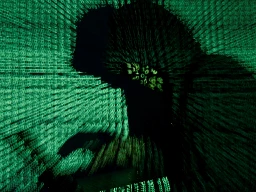
Hacking group RedJuliett compromised two dozen organisations in Taiwan and elsewhere, report says.
A suspected China-backed hacking outfit has intensified attacks on organisations in Taiwan as part of Beijing’s intelligence-gathering activities on the self-governing island, a cybersecurity firm has said.
The hacking group, RedJuliett, compromised two dozen organisations between November 2023 and April of this year, likely in support of intelligence collection on Taiwan’s diplomatic relations and technological development, Recorded Future said in a report released on Monday.
RedJuliett exploited vulnerabilities in internet-facing appliances, such as firewalls and virtual private networks (VPNs), to compromise its targets, which included tech firms, government agencies and universities, the United States-based cybersecurity firm said.
RedJuliett also conducted “network reconnaissance or attempted exploitation” against more than 70 Taiwanese organisations, including multiple de facto embassies, according to the firm.
“Within Taiwan, we observed RedJuliett heavily target the technology industry, including organisations in critical technology fields. RedJuliett conducted vulnerability scanning or attempted exploitation against a semiconductor company and two Taiwanese aerospace companies that have contracts with the Taiwanese military,” Recorded Future said in its report.
“The group also targeted eight electronics manufacturers, two universities focused on technology, an industrial embedded systems company, a technology-focused research and development institute, and seven computing industry associations.”
While nearly two-thirds of the targets were in Taiwan, the group also compromised organisations elsewhere, including religious organisations in Taiwan, Hong Kong, and South Korea and a university in Djibouti.
Recorded Future said it expected Chinese state-sponsored hackers to continue targeting Taiwan for intelligence-gathering activities.
"We also anticipate that Chinese state-sponsored groups will continue to focus on conducting reconnaissance against and exploiting public-facing devices, as this has proved a successful tactic in scaling initial access against a wide range of global targets,” the cybersecurity firm said.
China’s Ministry of Foreign Affairs and its embassy in Washington, DC did not immediately respond to requests for comment.
Beijing has previously denied engaging in cyber-espionage – a practice carried out by governments worldwide – instead casting itself as a regular victim of cyberattacks.
China claims democratically ruled Taiwan as part of its territory, although the Chinese Communist Party has never exerted control over the island.
Relations between Beijing and Taipei have deteriorated as Taiwan’s ruling Democratic Progressive Party has sought to boost the island’s profile on the international stage.
On Monday, Taiwanese President William Lai Ching-te hit out at Beijing after it issued legal guidelines threatening the death penalty for those who advocate Taiwanese independence.
“I want to stress, democracy is not a crime; it’s autocracy that is the real evil,” Lai told reporters.
Lai, whom Beijing has branded a “separatist”, has said there is no need to formally declare independence for Taiwan because it is already an independent sovereign state.
-
Canada expresses concern about human rights violations in China's Xinjiang region, groups urge U.N. human rights chief to take more action over "documented abuses against Uyghurs and other Muslims"
Canada's ambassador to Beijing visited the region of Xinjiang last week and expressed concerns about human rights violations directly to local leaders, the Canadian foreign ministry said in a statement on Sunday.
A 2022 report by the then U.N. human rights chief said China's treatment of Uyghurs, a mainly Muslim ethnic minority in Xinjiang, in the country's far west, could constitute crimes against humanity. Beijing denies the allegations.
Ambassador Jennifer May visited Xinjiang from June 19-22, the first such visit by a Canadian envoy in a decade. "(This) served as an opportunity to communicate Canadian concerns about the human rights situation directly to the leadership of Xinjiang," the ministry statement said.
"Ambassador May raised concerns over credible reports of systematic violations of human rights occurring in Xinjiang affecting Uyghurs and other Muslim ethnic minorities, including those raised by U.N. experts," it continued.
The Chinese embassy in Ottawa was not immediately available for comment. May visited Xinjiang a few weeks after Canada said it had warned China against meddling in its elections. In April, Prime Minister Justin Trudeau said Beijing had tried to interfere in the last two national votes, a charge China dismissed.
Campaign groups on Saturday urged U.N. human rights chief Volker Turk to take more action over what they said were documented abuses against Uyghurs and other Muslims.
May also reiterated Canada's calls for China to allow U.N. independent experts unfettered access to all regions of China, the statement said. Canada, like the United States, has imposed sanctions on individuals and entities over alleged rights abuses in Xinjiang.
-
Taiwan slams China death penalty for 'diehard' Taiwan independence advocates as 'Beijing has no jurisdiction over Taiwan'
focustaiwan.tw MAC slams China death penalty for 'diehard' Taiwan independence advocates - Focus TaiwanThe Mainland Affairs Council (MAC) on Friday evening denounced a new guideline issued by the Chinese authorities threatening to punish "diehard" advocates of Taiwan independence with the death penalty, calling the move detrimental to bilateral people-to-people exchanges.
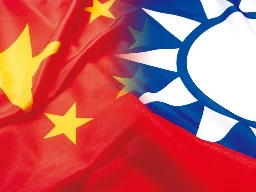
Taiwan's Mainland Affairs Council (MAC) on Friday evening denounced a new guideline issued by the Chinese authorities threatening to punish "diehard" advocates of Taiwan independence with the death penalty, calling the move detrimental to bilateral people-to-people exchanges.
In a press release, the MAC called the guideline laid out by Chinese officials earlier the same day "regrettable" and described it as provocative and detrimental to exchanges between people on both sides of the Taiwan Strait.
"The Beijing authorities have no jurisdiction over Taiwan," said the MAC, the top government agency handling cross-strait affairs, adding that China's "so-called laws and regulations have no binding force on our people."
However, the MAC also urged Taiwanese living in China or considering travel there to exercise caution.
At a press conference in Beijing, Chinese officials unveiled the guidelines on punishing "Taiwan independence diehards" convicted of "inciting secession," under which those involved in serious cases against the country could receive the death penalty.
The guideline, drafted in accordance with existing Chinese laws, such as the 2005 Anti-Secession Law, detail the offences of splitting the country and inciting secession and the penalties those found guilty of such offences can face.
-
Human rights groups urge UN to act on crimes against humanity against minorities in the Xinjiang region
www.hrw.org China: UN Should Act on Crimes Against HumanityThe United Nations High Commissioner for Human Rights, Volker Türk, should provide a public update of measures taken by the Chinese government and by his office to address the human rights situation in Xinjiang, Human Rights Watch, Amnesty International, the International Service for Human Rights, a...

The United Nations High Commissioner for Human Rights, Volker Türk, should provide a public update of measures taken by the Chinese government and by his office to address the human rights situation in Xinjiang, Human Rights Watch, Amnesty International, the International Service for Human Rights, and the World Uyghur Congress said today, releasing a series of translations of the report by his office on Xinjiang published in 2022.
The Office of the High Commissioner’s 2022 report concluded that violations in the region “may constitute international crimes, in particular crimes against humanity.” The ongoing absence of public reporting by the high commissioner to follow-up the atrocity crimes documented by his own office, risks undermining the trust placed in his office by victims and survivors. At the same time, UN member states need to take more determined action to fight against impunity.
“The publication of the UN human rights office’s report was a landmark moment for highlighting the gravity of human rights violations in Xinjiang,” said Elaine Pearson, Asia director at Human Rights Watch. “Now it’s up to the UN high commissioner to make full use of that report to improve the situation for Uyghurs and other Turkic Muslims in Xinjiang.”
-
Why is China targeting #MeToo activists?
www.dw.com Why is China targeting #MeToo activists? – DW – 06/17/2024After a court in China handed prison terms to two activists, DW looks at the motivations behind Beijing's crackdown on social justice campaigners and rights activists' struggle for accountability.

After a court in China handed prison terms to two activists, DW looks at the motivations behind Beijing's crackdown on social justice campaigners and rights activists' struggle for accountability.
Leading Chinese women's rights advocate Huang Xueqin was sentenced to five years in prison on Friday for "inciting subversion of state power," according to a group campaigning for her release and a copy of the verdict issued by a court in Guangdong.
The#MeToo activist was sentenced alongside labor rights activist Wang Jianbing, who was given three years and six months in prison on the same charge. Wang has spoken out in support of women reporting sexual harassment.
The two have already been detained for over 1,000 days after being arrested in September 2021. They have maintained their innocence throughout their detention and trial.
'Zero tolerance for independent thinking'
Huang and Wang often held gatherings for Chinese youth during which they discussed social issues. It is widely believed that Chinese authorities viewed their meetings as a threat to national security.
"It reflects the zero tolerance the [Chinese] government has over people who show any kind of independent thinking," Wang Yaqiu, Research Director for China at Freedom House, a US-based human rights organization, told DW.
Beijing's crackdown on social movements
Wang Yaqiu warned that the convictions of the two activists, affectionately nicknamed "XueBing" by their friends and supporters, would further narrow "the almost non-existent civil society space."
The decline of China's civil society landscape has been a long and challenging process for local activists.
In 2015, over 300 lawyers and human rights defenders were arrested in a nationwide sweep called the "709 crackdown." The name derives from the date it began: July 9. The arrests targeted legal professionals and activists advocating for human rights and the rule of law.
Over the past decade, Beijing has also restricted overseas NGOs from operating in the country and suppressed feminist and LGBTQ+ movements by arresting leading advocates.
China's #MeToo campaign
Huang emerged as a key voice for women's rights in China during the 2018 #MeToo movement, which originated in the United States — but unlike its Western counterpart, the Chinese campaign was initially introduced and promoted by university students who accused professors of sexual abuse and harassment.
Huang helped spark China's first #MeToo case in 2018 when she publicized allegations of sexual harassment made by a graduate student against her PhD supervisor at one of China's most prestigious universities.
Later, Huang collaborated with Wang to organize social gatherings for activists at his apartment in the southeastern Chinese city of Guanzhong.
Efforts to rebuild civil society
Wang wanted to rebuild the civil society community and provide support to young NGO workers and activists because many of them faced obstacles working in a highly censored environment.
Rio, a friend of the two activists who regularly attended the gatherings in Wang's apartment, told DW they never thought such informal events would be a problem to the Chinese government until a police raid.
Rio described how the attendees supported each other by sharing their work challenges, learning from guest speakers — and simply unwinding by playing board games together.
"It was not meant to criticize the government privately … it's a very constructive conversation," Rio said, speaking under a pseudonym due to safety concerns. Why does Beijing seem 'insecure' about social events?
It was not the first time Chinese authorities targeted people involved in social gatherings.
In 2019, dozens of lawyers and activists who attended a private meeting in Xiamen, a port city on the southeast coast of China, were also summoned and questioned by the police. Some of them were arrested and have remained incarcerated ever since.
Lü Pin, a Chinese feminist activist currently living in the United States, said this was a "preemptive measure" against dissidents or activists building connections with one another — which could form the foundation of social resistance in the future.
Wang Yaqiu, the Freedom House researcher, also told DW that Chinese authorities found social connections "very threatening" as they usually led to solidarity and empowerment.
The "XueBing" case once again "speaks of how insecure Xi Jinping and the CCP are," she said, referring to the Chinese president and the country's ruling Communist Party.
A huge setback for Chinese civil society
Rio is one of the core members of the online support group Free Huang Xueqin and Wang Jianbing, which was formed after the duo's arrest to provide information on the case. So far, Chinese authorities have only made a few details public.
Most of the group's members were frequent participants in the gatherings, and according to Rio, more than 70 of them have been interrogated by the police.
At least 10 people have been forced to move to other cities, and some were reportedly coerced into signing documents with false statements during their interrogations. These documents may have been used as evidence to charge Huang and Wang, some group members told Rio.
"This is a big attack for many young activists in Guangzhou," Rio said. "We have cultivated the community for many years, but the government cracked down on everything very easily."
Lü told DW that the case had had "a huge impact" on feminist communities as well. They feel "an overwhelming sense of anger… and fear" whenever they think about it.
She said that the authorities intended to demonstrate that "its arbitrary actions essentially have no boundaries" by suppressing activists.
'You never know when the next peak will come'
Following the sentencing on Friday, Beijing's foreign ministry spokesman, Lin Jian, said that China "guarantees the legitimate rights of every citizen in accordance with the law."
He added: "At the same time, anyone who breaks the law will receive legal punishment."
But the momentum of activism in some areas, such as calling for women's rights and addressing sexual harassment, will not be easy to quench.
"You never know when the next peak will come," Lü said, referring to the #MeToo movement, "because this system continuously produces victims, and the victims will resist and prompt those around them to speak out."
"This will not stop."
-
China’s war games near Taiwan threaten international peace and security, researcher says
theconversation.com China’s war games near Taiwan threaten international peace and securityThe latest war games by China near Taiwan are just another reminder of the various ways Chinese authorities try to undermine liberal democracies and international peace and security.

By Kuan-Wei Chen, Researcher, Air and Space Law, McGill University
Taiwan recently saw yet another peaceful transition of power with the inauguration of President Lai Ching-Te, who was elected to office in January.
In his inaugural speech, Lai called on neighbouring China to cease its acts of intimidation and to “choose dialogue over confrontation.”
China responded by launching a simulated blockade of Taiwan. The People’s Liberation Army released images boasting its ability to rain missiles on one of the most densely populated countries in the world as “strong punishment.”
Democracy under threat
Beijing’s standard reaction to the democratic voting rights of 24 million people is to threaten to “break skulls and let blood flow.” For China, Taiwan as a renegade province that must “return to the embrace of the motherland” despite the fact China does not have any authority over Taiwan.
In recent years, China has been trying to use its diplomatic clout and influence at the United Nations to rewrite history and legitimize its claim of sovereignty over Taiwan.
While Taiwan ranks highly on the Human Freedom Index (just one spot ahead of Canada), China is a techno-authoritarian state that has regressed even further under the reign of Xi Jinping.
Millions of Uyghur Muslims remain in re-education and forced labour camps, while Tibetans are forced to “Sinicize” and lose their cultural and religious heritage. Reaching beyond borders
Political dissidents, journalists and foreign nationals are not immune from intimidation or imprisonment.
In what has been termed transnational oppression, aided through Chinese so-called police stations operating with impunity overseas, the Chinese government targets and threatens Chinese nationals and critics of China wherever they are.
Reaching beyond borders
Political dissidents, journalists and foreign nationals are not immune from intimidation or imprisonment.
In what has been termed transnational oppression, aided through Chinese so-called police stations operating with impunity overseas, the Chinese government targets and threatens Chinese nationals and critics of China wherever they are.
Many governments, including Canada’s, caution against travel to China and Hong Kong due to the “risk of arbitrary enforcement” of laws prohibiting activities or speech critical of the Chinese Communist Party.
China’s censorship, surveillance and arbitrary arrests are widespread, and such tactics and technologies are alarmingly being exported worldwide.
While the Chinese government condemns the forced divestment of TikTok, the app — together with Facebook, WhatsApp and Google — are all banned within the great firewall of China.
War games
When former United States House Speaker Nancy Pelosi visited Taiwan in 2022, China conducted similar war games.
Known as “grey-zone” tactics, they fall short of the use of force, which is prohibited under international law. Also referred to as “salami slicing,” grey-zone tactics that are not strictly attacks make it hard for others to respond without potentially escalating a situation to a conflict.
But not responding to threats of force or military intimidation risks normalizing such aggressive behaviour and emboldening China to further destabilize international peace and stability.
Such acts of harassment and threats can happen not just on Earth but in cyberspace and outer space, all of which can have severe repercussions on civilian life and infrastructure.
Pattern of reckless behaviour
Closely allying with Russia, and actively supplying weapons to sustain its war in Ukraine, China has not concealed its desire to reshape the world order.
Taiwan is not alone suffering China’s increasingly brazen naval and aerial military operations. Canadian and Australian aircraft enforcing United Nations sanctions against North Korea have also been repeatedly harassed on international waters, where states supposedly enjoy the freedom of navigation.
Meanwhile, China is continuously engaged in violent border clashes with India, is challenging the sovereignty of islands that belong to Japan and militarizing islands in the disputed waters of the South China Sea.
Deliberate jamming of navigation and emergency distress signals in the Asia-Pacific, which threatens the safety of international aviation, has also been attributed to China.
Why Taiwan matters
Tech executives around the world were recently in Taiwan to talk about the future of AI and innovative technologies. With Taiwan’s prowess in computing technologies and chip production, Jensen Huang — the Taiwanese-born NVIDIA CEO — described his homeland as “the unsung hero, a steadfast pillar of the world.”
But Taiwan is also on the front lines of an increasingly aggressive and assertive China. On a daily basis, Taiwan experiences the highest rate of cyberattacks in the world originating from China, all aimed at disrupting government services and sowing social distrust.
Taiwan has much to share with the world on how to enhance citizen participation in the digital age, counter foreign influence and dispel misinformation and disinformation that undermine trust in democratic institutions and processes.
The latest war games surrounding Taiwan are just another reminder of the various ways China tries to undermine liberal democracies and international peace and security. Today it may be a simulated attack. But the world must stand together and prevent it ever becoming reality.
-
Chinese coast guard personnel armed with swords, spears and knives accused of ramming Filipino boats in disputed South China Sea
www.bbc.com South China Sea: Filipino soldiers fought off Chinese 'with bare hands'Chinese personnel armed with swords are accused of ramming Filipino boats in disputed waters.
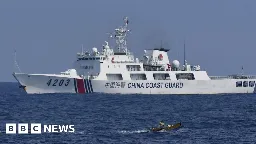
Philippines soldiers used their "bare hands" to fight off Chinese coast guard personnel armed with swords, spears and knives in the disputed South China Sea, the country's top military commander has said.
General Romeo Brawner accused Chinese vessels of ramming Philippine boats, then boarding them and seizing weapons.
One Filipino soldier lost a thumb when his vessel was rammed, the general said. China denied its personnel were to blame, saying they had been "restrained".
There have been a string of dangerous encounters as the two sides seek to enforce their claims on disputed reefs and outcrops - this appears to be an escalation.
The skirmish happened as the Philippine navy and coast guard were delivering supplies to Filipino troops stationed in the Second Thomas Shoal.
Gen Brawner said soldiers reported seeing the Chinese coast guard armed with knives, spears and bolos, Filipino for sword. He said it's the first time Filipino troops had seen the Chinese using this type of weapon in the area.
"We saw in the video how the Chinese even threatened our personnel by pointing their knives at our personnel," Gen Brawner said.
Chinese personnel also seized a number of guns and destroyed items - including motors - and punctured inflatable vessels.
The incident, he added, amounted to "piracy".
"They have no right or legal authority to hijack our operations and destroy Philippine vessels operating within our exclusive economic zone," Gen Brawner told reporters.
But Beijing dismissed the allegations, saying its personnel were aiming to block an "illegal transportation" of supplies. "No direct measures" were taken against the Filipino soldiers, foreign ministry spokesman Lin Jian told reporters in Beijing.
"Law enforcement measures taken by the China Coast Guard at the site were professional and restrained," he added.
In an earlier statement, the Chinese coast guard said the Philippines was "entirely responsible" for the incident, as troops “ignored China’s repeated solemn warnings... and dangerously approached a Chinese vessel in normal navigation in an unprofessional manner, resulting in a collision”.
China has routinely attempted to block re-supply missions to the shoal. Filipino officials say the Chinese employ "dangerous manoeuvres" such as shadowing, blocking, firing water cannons and shining lasers to temporarily blind Filipino crews.
Monday's confrontation took part in an area at the heart of the sea encounters: the Filipino outpost in Second Thomas Shoal, where the country grounded a decrepit navy ship to enforce its claim.
A handful of soldiers are stationed there and require regular rations.
Analysts say choking the flow of supplies to the outpost, which could lead to its collapse into the sea, would allow Beijing to take full control of the area.
Observers fear any escalation in the South China Sea could spark a conflict between China and the US as it is treaty-bound to come to the Philippines' defence, should it come under attack.
Philippine President Ferdinand Marcos warned security forum in Singapore last month that if a Filipino died as a result of China’s wilful actions, Manila would consider it as close to “an act of war” and would respond accordingly.
But Gen Brawner said the Philippines military did not want to spark a war.
"Our objective is that while we want to bring supplies to our troops following international law, our objective is to prevent war," he said.
-
Australian PM Albanese told Chinese premier that officials’ behaviour towards Cheng Lei was ‘unacceptable’ and ‘not appropriate’
theconversation.com Albanese told Chinese premier that officials’ behaviour towards Cheng Lei was ‘unacceptable’ and ‘not appropriate’The Chinese media, however, hails a ‘spring blossom’ in China’s relations with Australia as premier’s visit concludes.
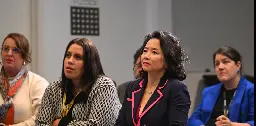
The Albanese government has formally expressed its displeasure to the Chinese embassy over Chinese officials trying to impede camera shots of journalist Cheng Lei during Premier Li Qiang’s visit to Canberra this week.
Prime Minister Anthony Albanese told the ABC on Tuesday: “When you look at the footage, it was a pretty clumsy attempt […] by a couple of people to stand in between where the cameras were and where Cheng Lei was sitting”.
Albanese said Australian officials had intervened to ask the Chinese officials to move, “and they did so.” Australian officials had “followed up with the Chinese embassy to express our concern,” he said.
At his press conference later on Monday, which Cheng attended, Albanese said he was “not aware” of the incident. The opposition questioned his response.
On Tuesday, he said Cheng, who works for Sky, was “a very professional journalist. And there should be no impediments to Australian journalists going about their job. And we’ve made that clear to the Chinese embassy.”
Opposition leader Peter Dutton welcomed the government raising the issue with the embassy. But he said: “I do want to point out that the prime minister clearly misled the Australian people yesterday when he got up and did a press conference and said that he heard nothing of it […] it’s completely inconceivable”.
Meanwhile, Albanese has indicated he believes there is no impediment to media organisations again posting correspondents to China.
The China correspondent for The Australian Financial Review, Mike Smith, and the ABC’s correspondent, Bill Birtles, were forced out in 2020.
They left after Chinese security officials visited their homes late at night, telling them they needed to be questioned over “a national security case”. Before departing, they spent several days under Australian diplomatic protection, while negotiations between officials of the two countries for their departure took place.
This followed immediately after the Chinese government confirmed Cheng’s detention in Beijing. She was later tried in secret for what she said was breaking an embargo on a story by a few minutes. She was released only last year [after three years in Chinese detention].
Asked on Monday whether he had raised the question of the Australian media getting back into China, Albanese said he’d done so in his China visit late last year.
“The Chinese side say that they are willing to grant that access. And speaking to some media organisations as well, it’s a matter of whether they wish to send people in there. I think that is the point,” he said.
A spokesman for the ABC said, “The ABC remains very interested in basing a correspondent in China”.
The incident on Monday took place when Albanese and Li were together at an agreement-signing event at parliament house in Canberra.
-
China Changes Hundreds of Uyghur Village Names as Part of Broader Government Effort to Erase Uyghur Culture in Xinjiang
www.hrw.org China: Hundreds of Uyghur Village Names ChangeChinese authorities in Xinjiang have been systematically changing hundreds of village names with religious, historical, or cultural meaning for Uyghurs into names reflecting recent Chinese Communist Party ideology. Human Rights Watch has identified about 630 villages where the names have been change...
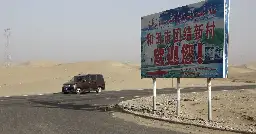
Chinese authorities in Xinjiang have been systematically changing hundreds of village names with religious, historical, or cultural meaning for Uyghurs into names reflecting recent Chinese Communist Party ideology, Human Rights Watch said.
"The Chinese authorities have been changing hundreds of village names in Xinjiang from those rich in meaning for Uyghurs to those that reflect government propaganda,” said Maya Wang, acting China director at Human Rights Watch. “These name changes appear part of Chinese government efforts to erase the cultural and religious expressions of Uyghurs.”
In joint research, Human Rights Watch and Norway-based organization Uyghur Hjelp (“Uyghur help”) scraped names of villages in Xinjiang from the website of the National Bureau of Statistics of China between 2009 and 2023.
The names of about 3,600 of the 25,000 villages in Xinjiang were changed during this period. About four-fifths of these changes appear mundane, such as number changes, or corrections to names previously written incorrectly. But the 630, about a fifth, involve changes of a religious, cultural, or historical nature.
The changes fall into three broad categories. Any mentions of religion, including Islamic terms, such as Hoja (霍加), a title for a Sufi religious teacher, and haniqa (哈尼喀), a type of Sufi religious building, have been removed, along with mentions of shamanism, such as baxshi (巴合希), a shaman.
Any mentions of Uyghur history, including the names of its kingdoms, republics, and local leaders prior to the founding of the People’s Republic of China in 1949, and words such as orda (欧尔达), which means “palace,” sultan (苏里坦), and beg (博克), which are political or honorific titles, have also been changed. The authorities also removed terms in village names that denote Uyghur cultural practices, such as mazar (麻扎), shrine, and dutar (都塔尔), a two-stringed lute at the heart of Uyghur musical culture.
-
Beijing urges Britain to stop sanctioning Chinese firms over Russian links
China's commerce ministry said on Wednesday that it had urged Britain to stop sanctioning Chinese firms after the country sanctioned five Chinese companies over their links to Russia.
In a statement, the ministry said China "firmly opposes Britain's actions on the grounds that the Chinese companies are "related to Russia."
Britain last week imposed its first sanctions targeting vessels in Russian President Vladimir Putin's "shadow fleet" that it said was used to circumvent Western sanctions on the trade in Russian oil.
The action, part of 50 new sanctions and coordinated with G7 partners, also targeted suppliers of munitions, machine tools, microelectronics, and logistics to Russia's military, including entities based in China, Israel, Kyrgyzstan and Turkey, the British government said.
Britain's approach has ignored China's representations and the momentum and had a negative impact on economic and trade relations between China and the UK, China's commerce ministry said.
"Britain's approach is a unilateral sanction that has no basis in international law," it added. "We urge Britain to immediately correct its erroneous practices."
-
Tensions in South China Sea: Japan, Canada join chorus of ‘concern’ after China’s recent actions ‘severely injured’ Filipino soldier and damaged Philippine ship
www.rappler.com Japan, Canada join chorus of 'concern' over actions that increase tensions in South China SeaMore countries issue statements after China’s actions on June 17 ‘severely injured’ a Filipino soldier and damaged a Philippine ship
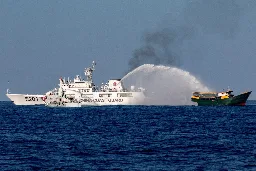
Japan and Canada on Tuesday, June 18, joined the Philippines’ treaty-ally the United States and strategic partner Australia in expressing support for Manila following the latest – and worst, thus far – incident between Chinese and Filipino personnel and vessels in the West Philippine Sea.
“Japan reiterates serious concern over repeated actions which obstruct freedom of navigation and increase regional tensions including recent dangerous actions that resulted in damage to the Filipino vessel and injuries to Filipinos onboard,” the Japanese Ministry of Foreign Affairs (MOFA) said in a statement late June 18.
On June 17, a Philippine military mission to bring supplies for and rotate troops assigned to the BRP Sierra Madre in Ayungin Shoal was disrupted by Chinese maritime personnel.
The Philippines’ National Security Council (NSC) said China used “dangerous maneuvers, including ramming and towing” in disrupting the mission. The Armed Forces of the Philippines (AFP), a day after the incident, confirmed that a soldier was “severely injured” because of China’s “intentional ramming.”
Japan and Canada are the latest countries to issue statements in support of the Philippines after the June 17 incident in Ayungin Shoal. The US State Department and Australia’s Department of Foreign Affairs and Trade also earlier released statements from Washington and Canberra, respectively.
In its statement, Japan said that issues in the South China Sea are “directly related to the peace and stability of the region and is a legitimate concern of the international community.”
“Japan opposes any unilateral attempts to change the status quo by force as well as any actions that increase tensions in the South China Sea,” said the MOFA.
Japan also reiterated its concern over “unlawful maritime claims and steadfastly opposes the dangerous and coercive use of Coast Guard and maritime militia vessels in the South China Sea.” A similar statement was made following the historic trilateral meeting between United States President Joe Biden, Japanese Prime Minister Fumio Kishida, and Philippine President Ferdinand Marcos Jr. in April 2024.
Tokyo said it “appreciates” Manila “for having consistently complied with the [2016] Arbitral Tribunal’s award,” and for its “commitment to the peaceful settlement of disputes in the South China Sea.”
Japan and the Philippines enjoy close economic, political, diplomatic, and security ties. Japan has helped the modernize the Philippine Coast Guard, among the units in the frontlines of the Philippines’ push to defend its sovereign rights and claims in the West Philippine Sea.
The two countries are also in the process of concluding a Reciprocal Access Agreement, a deal that would set terms for visits and deployment of troops to each others’ territories.
Canada also scored China for its “dangerous and destabilizing actions” against Philippine vessels during the June 17 resupply mission.
“The PRC’s use of water cannons, dangerous maneuvers and ramming of Philippine vessels is inconsistent with the PRC’s obligations under international law, including the UN Convention on the Law of the Sea [UNCLOS],” said Global Affairs Canada in a statement on its website.
“Canada opposes escalatory and coercive actions, including the unilateral declaration of authority over disputed features. Disputes must be resolved through dialogue rather than through force or coercion,” added the North American nation.
“We call upon the PRC to comply with its obligations, including implementation of the 2016 UNCLOS arbitral tribunal ruling, which is binding on the parties.”
Ayungin Shoal is among a flashpoint in tensions between China and the Philippines. The June 17 incident is the first confrontation between the two since China unilaterally imposed a new “regulation” for its coast guard that allows it to detain for up to 60 days persons they deem as “trespassers” in waters they consider theirs.
Canada is among a growing list of countries that have been eager to further improve ties – particularly covering defense and security – with the Philippines. It recently gave Philippine maritime agencies access to its dark vessel detection system.
Ottawa is also keen on forging a visiting forces-like agreement with Manila, following the signing of a defense cooperation memorandum in January 2024.
- fortune.com China’s cash-strapped local governments are chasing back taxes stretching back to the 1990s
China's real estate crisis is putting pressure on local governments to expand revenue, as land sale income plunges.
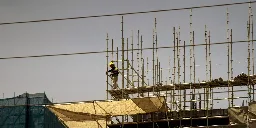
Local governments in China have asked several companies to pay tax bills dating back as far as the 1990s, underscoring their need for funding given the uneven economic recovery and persistent housing slump.
A number of listed firms have said in exchange filings in recent months that they’ve gotten government demands to pay tens of millions in back taxes and warned investors this could impact their earnings.
V V Food & Beverage Co. said last week that a liquor-making unit was told to pay some 85 million yuan ($11.7 million) on income it “failed to disclose” for about 15 years starting in 1994. ChinaLin Securities Co., Ningbo Bohui Petrochemical Technology Co., Zangge Mining Co. and PKU HealthCare Corp. have issued similar statements.
China’s local governments are facing unprecedented pressure to expand revenues because economic growth is slowing and the contracting real estate market has sent income from land sales plunging. Their already elevated debt stockpile is limiting their ability to leverage up further, forcing the central government to borrow more and give them the funds.
The tax recovery is “likely due to the fiscal distress of local governments,” said Xing Zhaopeng, an analyst at Australia & New Zealand Banking Group. “I think they need some money to pay by quarter end” because regional authorities usually pay contractors of government projects then, he added.
Local governments booked less than 5.8 trillion yuan in revenues under the general public budget and the government-fund account, which include taxes and land sales income, in the first four months of the year. That figure was less than the more than 5.9 trillion yuan in the same period last year, according to data from the Finance Ministry.
Their spending also fell to just under 10 trillion yuan from 10.4 trillion yuan a year earlier.
-
China should pay for propping up Putin's war, Nato chief says
www.bbc.com China should pay for propping Russia's Ukraine war - Nato chiefJens Stoltenberg tells the BBC China should face "costs" for supporting Russia's war in Ukraine.

Here's Mr. Stoltenberg's statement in a video (1 min)
The head of Nato has told the BBC that China should face consequences for supporting Russia's war in Ukraine, if it does not change its ways.
Jens Stoltenberg said Beijing was "trying to get it both ways" by supporting Russia's war effort, while also trying to maintain relationships with European allies.
"This cannot work in the long run," Mr Stoltenberg told BBC News during a visit to Washington.
In the wide ranging interview, Mr Stoltenberg also addressed nuclear weapons and defence spending.
His comments come as Russia shows no sign of easing its war against Ukraine.
A peace summit held in Switzerland at the weekend saw dozens of nations commit to supporting Kyiv, but Russia called it a waste of time and said it would only agree to peace talks if Ukraine essentially surrendered.
When pressed on what Nato members might do about China's support of Russia, Mr Stoltenberg said there was an "ongoing conversation" about possible sanctions.
He said China was "sharing a lot of technologies, [like] micro-electronics, which are key for Russia to build missiles, weapons they use against Ukraine".
He added that "at some stage, we should consider some kind of economic cost if China doesn't change their behaviour".
Beijing is already under some sanctions for its support of Russia - last month, the US announced restrictions that would target about 20 firms based in China and Hong Kong.
China has defended its business with Moscow, saying it is not selling lethal arms and "prudently handles the export of dual-use items in accordance with laws and regulations".
Mr Stoltenberg's visit to Washington came as the Kremlin confirmed that Vladimir Putin will travel to North Korea on Tuesday.
It follows his visit to China last month.
Russia has become increasingly isolated on the world stage since it launched its full-scale war with Ukraine in 2022. Mr Putin has repeatedly said that the West's balance of power is shifting, and he has worked to strengthen ties with like-minded leaders.
"Russia right now is aligning more and more with authoritarian leaders," Mr Stoltenberg told the BBC, listing Iran, Beijing and North Korea.
He said that the North has sent artillery shells to Russia, and in return Russia had given advanced technology for North Korea's missile and nuclear programmes.
"So North Korea is helping Russia to conduct a war of aggression against Ukraine."
Speaking ahead of a meeting with US President Joe Biden, the Nato chief also announced that more than 20 nations are expected to meet a defence spending target of 2% this year - more than any other year since it was pledged in 2014.
"This is good for Europe and good for America, especially since much of this extra money is spent here in the United States," he said.
Mr Stoltenberg also addressed comments that he made to the Telegraph on Sunday which indicated that Nato may be considering increasing the number of deployable warheads as a deterrent against growing threats from Russia and China.
The comments were criticised as "nothing but another escalation of tension" by Kremlin spokesman Dmitry Peskov.
But Mr Stoltenberg said they were a "general message" that Nato is a nuclear alliance, and that any attack on a Nato member will "trigger a response from the whole alliance".
"The purpose of Nato is not to fight the war, the purpose of that is to prevent the war," he said.
-
Australian police accused of 'unnecessary force' against demonstrators who were protesting against China during Chinese premier's visit to parliament
www.sbs.com.au Police accused of 'excessive force' by protester during Chinese premier's visit to parliamentA protester has claimed the Australian Federal Police used "brutalising" force in Canberra, as China's premier met with Prime Minister Anthony Albanese and dignitaries at Parliament House.
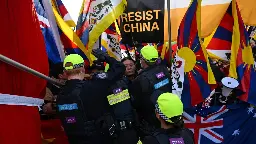
- One protester has claimed the Australian Federal Police used "brutalising" force in Canberra, as China's premier met with Prime Minister Anthony Albanese and dignitaries at Parliament House.
- Australian journalist Cheng Lei, who was freed last year after being detained in China for three years, claims she was blocked by Chinese officials during a signing ceremony during official proceedings.
- "I think the worry is that my being there is a symbol of some sort, and maybe they didn't want that for the domestic audience," Cheng Lei said. "Having dealt with Chinese officialdom on these sorts of events, they are very, very control freak-ish, so they want to know everything and they want to stage-manage everything."--
Critics of the Chinese Communist Party have accused Australian Federal Police (AFP) officers of using "unnecessary" force against demonstrators who were protesting against a visit by a Chinese official on the lawns of Parliament House.
Chinese premier Li Qiang's four-day visit to Australia sparked a face-off between protesters in Canberra on Monday, with pro-China demonstrators colliding with the Australian Tibetan community and the Hong Kong pro-democracy movement, vocally opposing his visit.
Human rights activist and journalist Vicky Xu criticised the AFP after she was filmed being dragged by officers as she held the Chinese flag on Monday.
"A friend of mine had a Chinese Communist Party flag, that he was planning to burn," she told SBS News.
"I saw that the police were trying to forcefully take the flag away from him, so I intervened and tried to understand what was happening.
"Next thing I knew I was being shoved by the police."
She claims an officer had a hand on her neck and that her finger was twisted during the incident.
While she understood the need for the AFP to reduce the temperature and ensure peaceful protesting, she said it was "too much force", labelling it "brutalising" on X.
SBS News has contacted ACT Policing for comment.
In a statement, it said: "The AFP has received no complaint in relation to police conduct in managing protests today at Parliament House".
Police have been forced to intervene from time to time as the protesters confront one another.
One person was arrested at the protests outside Parliament House for what ACT Policing said was "a breach of the peace".
The tense moments contrasted with the official reception for Beijing's second most powerful leader, with the day starting with a ceremonial welcome, including a cannon salute, on the forecourt of Parliament House in Canberra.
Li declared that Chinese-Australian ties were "back on track after a period of twists and turns" when he arrived on the weekend, for the first visit by a Chinese premier in seven years.
Cheng Lei says she was 'blocked' at Parliament House
But another moment during the proceedings has also raised eyebrows.
Australian journalist Cheng Lei, who was freed last year after being detained in China for three years, claims she was blocked by Chinese officials during a signing ceremony during official proceedings.
A video of the signing ceremony appears to show two Chinese officials blocking her from the view of cameras broadcasting the event and refusing to move when asked.
She told Sky News she believes this was done to prevent audiences from seeing her as a symbol of defiance of the Chinese government.
"I think the worry is that my being there is a symbol of some sort, and maybe they didn't want that for the domestic audience.
"Having dealt with Chinese officialdom on these sorts of events, they are very, very control freak-ish, so they want to know everything and they want to stage-manage everything."
China-Australia relations 'on right track'
Premier Li arrived at Parliament House to meet with Prime Minister Anthony Albanese and several cabinet members including Foreign Affairs Minister Penny Wong, Trade Minister Don Farrell and Resources Minister Madeleine King.
The prime minister's November 2023 trip to China followed by Li's current visit to Australia showed both countries attached "great importance" to their relationship, the premier said.
"This relationship is on the right track of steady improvement," he said. "Prime Minister Albanese and I have had a candid, in-depth and fruitful discussion that has reached a lot of common consensus."
Albanese said the bilateral talks were crucial for the Australia-China relationship which had been "renewed and revitalised" by the engagement.
The politicians signed four memoranda of understanding on the China-Australia Free Trade Agreement, climate change, education and research, strategic economic dialogue, and cultural cooperation.
Representatives of both nations then attended a state lunch with business and community leaders where they were served wine, wagyu beef and, most notably, Australian rock lobster - which remains subject to trade restrictions.
Agriculture Minister Murray Watt noted there had been "enormous progress" in restoring trade with China in the past few years after sanctions on coal, wine and barley were lifted.
The remaining trade bans are expected to be lifted within the coming weeks.
Also on the battle agenda of the high-level talks was the case of Australian writer Yang Hengjun, who languishes ill in a Chinese jail, and tensions in the South China Sea.
- www.theguardian.com Chinese firm sought to use UK university links to access AI for possible military use
Exclusive: Revelation of emails to Imperial College scientists comes amid growing concerns about security risk posed by academic tie-ups with China
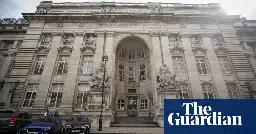
Revelation of emails to Imperial College scientists comes amid growing concerns about security risk posed by academic tie-ups with China
A Chinese state-owned company sought to use a partnership with a leading British university in order to access AI technology for potential use in “smart military bases”, the Guardian has learned.
Emails show that China’s Jiangsu Automation Research Institute (Jari) discussed deploying software developed by scientists at Imperial College London for military use.
The company, which is the leading designer of China’s drone warships, shared this objective with two Imperial employees before signing a £3m deal with the university in 2019.
Ministers have spent the past year stepping up warnings about the potential security risk posed by academic collaborations with China, with MI5 telling vice-chancellors in April that hostile states are targeting sensitive research that can “deliver their authoritarian, military and commercial priorities”.
The former Conservative leader Iain Duncan Smith said: “Our universities are like lambs to the slaughter. They try to believe in independent scientific investigation, but in China it doesn’t work like that. What they’re doing is running a very significant risk.”
The Future Digital Ocean Innovation Centre was to be based at Imperial’s Data Science Institute, under the directorship of Prof Yike Guo. Guo left Imperial in late 2022 to become provost of the Hong Kong University of Science and Technology.
The centre’s stated goals were to advance maritime forecasting, computer vision and intelligent manufacturing “for civilian applications”. However, correspondence sent before the partnership was formalised suggests Jari was also considering military end-uses.
The emails were obtained through freedom of information request by the charity UK-China Transparency.
A Mandarin-language email from Jari’s research director to an Imperial College professor, whose name is redacted, and another Imperial employee, dated November 2018, states that a key Jari objective for the centre is testing whether software developed by Imperial’s Data Science Institute could be integrated into its own “JariPilot” technology to “form a more powerful product”.
Suggested applications are listed as “smart institutes, smart military bases and smart oceans”.
“Our research presents evidence of an attempt to link Imperial College London’s expertise and resources into China’s national military marine combat drone research programmes,” said Sam Dunning, the director of UK-China Transparency, which carried out the investigation.
"Partnerships such as this have taken place across the university sector. They together raise questions about whether British science faculties understand that China has become increasingly authoritarian and militarised under Xi Jinping, and that proper due diligence is required in dealings with this state.”
There appears to have been a launch event for the joint centre in September 2019 and funding from Jari is cited in Imperial’s annual summary in 2021 under prestigious industry grants it attracted.
However, the partnership was ultimately terminated in 2021. Imperial said no research went ahead and the £500,000 of funding that had been received was returned in October 2021 after discussion with government officials.
“Under Imperial’s policies, partnerships and collaborations are subject to due diligence and regular review,” an Imperial spokesperson said. “The decision to terminate the partnership was made after consideration of UK export control legislation and consultation with the government, taking into consideration national security concerns.”
Charles Parton, a China expert at the Royal United Services Institute (RUSI), said the partnership was “clearly highly inappropriate” and should never have been signed off.
“How much effort does it take to work out that Jari is producing military weapons that could be used in future against our naval forces?” Parton said. “These people should have been doing proper due diligence way before this. It’s not good enough, late in the day having signed the contract, to get permission from [government].”
At the time of the deal, Imperial’s Data Science Institute was led by Prof Guo, an internationally recognised AI researcher. A Channel 4 documentary last year revealed that Guo had written eight papers with Chinese collaborators at Shanghai University on missile design and using AI to control fleets of marine combat drones. Guo is no longer affiliated with Imperial.
Imperial received more than £18m in funding from Chinese military-linked institutes and companies between 2017 and 2022, but since then it has been forced to shut down several joint-ventures as government policy on scientific collaboration has hardened.
“Governments of all stripes have taken a long time to understand what the threat is from China and universities for a long period have got away with this,” said Duncan Smith, who has had sanctions imposed on him by China for criticising its government. “There’s been a progressive and slow tightening up, but it’s still not good enough. Universities need to be in lockstep with the security services.”
An Imperial College London spokesperson said: “Imperial takes its national security responsibilities very seriously. We regularly review our policies in line with evolving government guidance and legislation, working closely with the appropriate government departments, and in line with our commitments to UK national security.
“Imperial’s research is open and routinely published in leading international journals and we conduct no classified research on our campuses.”
Guo declined to comment on the Jari partnership, noting that he left Imperial at the end of 2022. Of his previous collaborations, he said that the papers were classified as “basic research” and were written to help advance scientific knowledge in a broad range of fields rather than solving specific, real-world problems.
-
German apparel brand Adidas investigates bribery allegations in China, FT says
Original article behind paywall
Adidas has launched an investigation into allegations of large-scale bribery in China after the company received a whistleblower complaint that accused senior staff of embezzling "millions of euros", the Financial Times reported on Sunday.
The anonymous letter, which claims to have been written by "employees of Adidas China", names several Chinese Adidas employees including a senior manager involved with the marketing budget in the country, which the document said stood at 250 million euros ($267.5 million) a year, the FT reported.
Adidas confirmed that it had received an anonymous letter on June 7 indicating potential compliance violations in China. The German sportswear company said it was investigating this matter together with external legal counsel.
"Adidas takes allegations of possible compliance violations very seriously and is clearly committed to complying with legal and internal regulations and ethical standards in all markets where we operate," it said in a statement issued in response to a Reuters query. Adidas said it could not provide further information until the investigation was completed.
According to the FT, the letter alleges that Adidas staff received kickbacks from external service providers who were commissioned by the company that include "millions in cash from suppliers, and physical items such as real estate". China sales of the German sportswear giant grew by 8% in the first-quarter, the company reported earlier.
-
Xi Jinping claimed the US wants China to attack Taiwan, FT reports
www.yenisafak.com Xi said US trying to ‘goad Beijing' into attacking Taiwan | AsiaBritish daily Financial Times claims Xi issued the warning in meeting with Ursula von der Leyen in April 2023
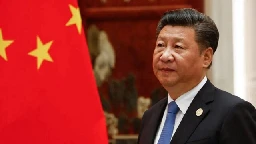
Original article behind paywall
British daily Financial Times claims Xi issued the warning in meeting with Ursula von der Leyen in April 2023.
China's President Xi Jinping told European Commission head Ursula von der Leyen that Washington was trying to “goad Beijing into attacking Taiwan,” the Financial Times said on Saturday.
In a report based on information from people familiar with the matter, the British daily said Xi issued the warning in a meeting with von der Leyen in April 2023. She paid an official visit to China last year which coincided with the state visit of French President Emmanuel Macron.
According to the newspaper, Xi said the US was trying to trick China into invading Taiwan, but that he would not take the bait.
The revelation comes as tensions are high across the Taiwan Strait. China responded to last month's inauguration of Lai Ching-te as Taiwan's new president with military drills around the island, which it claims as its own. Taipei, however, insists on its independence since 1949.
Xi's remarks are probably the first known case of him making the claim to a foreign leader.
The Chinese leader also said that a conflict with the US would undermine his goal of achieving a “great rejuvenation” by 2049.
US officials have, in recent years, increased engagement with Taiwan but the administration says it remains committed to its longstanding one-China policy.
At the Shangri-La Dialogue in Singapore this month, Chinese Defence Minister Dong Jun said the country's military was ready to “forcefully” stop Taiwan's independence.
Earlier, the Foreign Ministry said those supporting independence for Taiwan would find themselves “crushed.”
-
Amnesty International urges Australia to prioritise human rights during Chinese Premier Li Qiang’s visit
www.amnesty.org.au Championing human rights: A call to action during Chinese Premier Li Qiang’s visit to AustraliaAs Chinese Premier Li Qiang prepares for his upcoming visit to Australia, it’s more important than ever for the Australian Government to prioritise human As Chinese Premier Li Qiang prepares for his upcoming visit to Australia, it’s more important than ever for the Australian Government to prioritis...
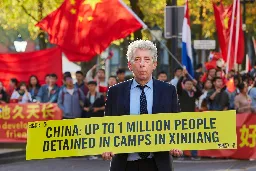
As Chinese Premier Li Qiang prepares for his upcoming visit to Australia, it’s more important than ever for the Australian Government to prioritise human rights in their discussions. While recent efforts to address human rights issues in Xinjiang, Tibet, Hong Kong, and broader China, highlighted during Foreign Minister Wang Yi’s visit in March, are welcomed, Premier Li’s visit is a unique opportunity to push for concrete commitments and tangible improvements from the Chinese Government.
Balancing Trade and Human Rights
Communities concerned about Uyghur, Tibetan, Hong Konger, and Chinese human rights rightly fear that renewed trade and economic ties, a key agenda of this visit, might compel governments like Australia to overlook human rights issues. This concern is not unfounded. The past thirty years of the Australia-China economic relationship have often seen economic interests overshadow human rights. It’s crucial for the Australian Government to demonstrate a commitment to upholding human rights and seeking accountability as part of renewing and repairing its relationship with China.
Key Areas for Human Rights Advocacy
Let’s delve into the key areas where tangible improvements are urgently needed:
Dr. Yang Hengjun: A Voice for Freedom
The suspended death sentence handed to Australian-Chinese writer Dr. Yang Hengjun is a shocking attack on freedom of expression and a grave affront to justice. Dr. Yang, like many other Chinese dissidents, has been detained for his outspoken support of human rights, facing horrendous conditions and long prison terms. We urge the Australian Government to call on the Chinese leadership to release Dr. Yang immediately and unconditionally on humanitarian grounds, ensuring he receives urgent and appropriate medical care.
Xinjiang: Families Torn Apart
Many Uyghurs in Australia remain separated from their family members, with some having had no contact for up to seven years. The UN has highlighted the large-scale separation of young Uyghur children into Chinese state-run boarding schools, while their parents are in exile, interned, or detained.
Uyghurs continue to be subjected to forced labour, despite a damning UN report two years ago that detailed these practices, which amount to crimes against humanity.
We urge the Australian Government to:
- Demand the release of spouses, parents, and relatives of Uyghur Australian citizens who have been incarcerated on trumped-up charges or are otherwise unable to make contact.
- Raise the issue of the forced removal of Uyghur children into state-run boarding schools and call on the Chinese leadership to end this policy.
- Call on the Chinese leadership to end forced labour programs in Xinjiang.
Tibet: Erasing a Culture
The situation in Tibet is equally alarming. Multiple UN human rights bodies have expressed concern over the Chinese state-run boarding school system that has separated at least one million Tibetan children from their families and culture. This is part of a broader plan to assimilate Tibetans into Chinese society and erase Tibet’s distinct identity. Additionally, forced labour programs and massive involuntary relocations have disrupted the lives of Tibetan farmers and nomads, compelling them to abandon traditional livelihoods for manufacturing and construction work.
We urge the Australian Government to:
Address the forced removal of Tibetan children into state-run boarding schools and the forced labour of nomads and farmers, urging the Chinese leadership to end these coercive policies.
Hong Kong: Silencing Dissent
The rapid disintegration of human rights in Hong Kong is deeply troubling. Last month’s arrest of six people, including human rights activist Chow Hang-tung, for alleged sedition under Article 23 legislation, highlights the continued use of laws to silence dissent. Recently, 14 Hong Kong opposition figures, including Australian-Hong Kong dual citizen Gordon Ng, were convicted of “conspiring to subvert state power” under the National Security Law, marking a near-total purge of the political opposition.
We urge the Australian Government to:
Call on the Chinese leadership to press Hong Kong authorities for the immediate and unconditional release of all those arrested under Article 23 and the National Security Law, including Australian citizen Gordon Ng.
Falun Gong: Ongoing Persecution
The persecution of Falun Gong practitioners in China continues unabated, with reports of arrests, unfair trials, and forced organ harvesting as documented by UN Special Rapporteurs and human rights experts. We urge the Australian Government to raise these issues during their meeting with Premier Li.
The Path Forward
Premier Li’s visit is a critical moment for Australia to reaffirm its commitment to human rights and hold the Chinese Government accountable. The Australian Government must ensure that economic interests do not overshadow the fundamental rights and freedoms of Uyghurs, Tibetans, Hong Kongers, and Chinese human rights defenders.
-
'We have no choice now’: Desperate to circumvent sanctions and do business with China, Russian companies resort to bartering and cryptocurrency pegged to the U.S. dollar
meduza.io ‘We have no choice now’ Desperate to circumvent sanctions and do business with China, Russian companies resort to cryptocurrency and bartering — MeduzaFor over half a year, Russian companies have been facing difficulties in processing payments with China. Fearing secondary sanctions, banks are refusing to transfer funds, leaving importers unable to bring goods into the country. Vladimir Putin raised this issue during his visit to Beijing in May, b...
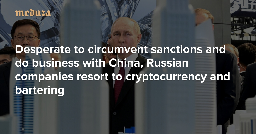
For over half a year, Russian companies have been facing difficulties in processing payments with China. Fearing secondary sanctions, banks are refusing to transfer funds, leaving importers unable to bring goods into the country. Vladimir Putin raised this issue during his visit to Beijing in May, but the situation doesn’t seem to have improved.
On December 22, 2023, U.S. President Joe Biden signed an executive order allowing sanctions to be imposed on banks from third countries if they are caught aiding the Russian military-industrial complex. Once blacklisted, these companies would be banned from holding correspondent accounts in American banks, meaning they’d be unable to conduct any dollar transactions. Following this order, dozens of Chinese financial organizations refused to accept transfers from Russia — not only in U.S. dollars but also in Chinese yuan.
On June 12 of this year, Washington tightened its demands. Previously, transactions involving five sectors of the Russian economy — technology, defense, construction, aerospace, and manufacturing — were under scrutiny. Now, the U.S. Treasury has expanded the definition of the military-industrial complex to include all companies previously sanctioned under Executive Order No. 14024. This means that the number of Russian entities that foreign banks must avoid to maintain access to dollar transactions has significantly increased. According to Castellum.AI, there are more than 4,000 such organizations.
Biden’s executive order — neither in its new nor old versions — has yet to be enforced against banks from third countries. So far, representatives of the U.S. administration have only issued verbal warnings: Secretary of State Antony Blinken expressed “serious concern” about the supply of machines and microelectronics to Russia, and Treasury Secretary Janet Yellen publicly mentioned the sanctions risk during her visit to China in early April.
This was enough to trigger significant shifts in trade between Russia and China. By the end of 2023, trade turnover had increased by 26 percent to a record $240 billion. However, in April 2024, China’s customs authority reported a 15 percent reduction in deliveries of cars, equipment, and other machinery. Bloomberg noted that exports to Russia fell for the first time in two years, linking this to sanctions risks. Chinese exports to Russia also fell in May, and Russian customs confirmed the continued decline of imports from Asia. Russia’s Central Bank acknowledged that it had become generally more difficult for Russian banks to open correspondent accounts abroad, even in “friendly” currencies, and directly linked this to “sanctions the United States adopted in December 2023.”
The issue was also discussed at the St. Petersburg International Economic Forum. Industry players reported that money transfers from Russia to China could take as long as three months, and even then might end up being returned to the sender. Businesses complained that they couldn’t even pay for theater decorations or children’s displays. Pavel Brun, the head of MasterProf, said his company hasn’t been able to arrange the supply of plumbing fixtures. “It’s like walking through a minefield,” he told Business FM.
Finding a workaround
Some hopes were pinned on Vladimir Putin’s mid-May visit to China. However, although Putin mentioned that the payment issue was discussed, he didn’t provide any specifics, and business owners confirmed that the difficulties in making payments persisted even after the delegation returned to Moscow.
A source in the trade industry told Reuters that the typical way Russian businessmen solve this problem is by going “from bank to bank, opening current accounts.” “If their payment doesn’t go through, they go to the next one,” the source explained. In response, Chinese financial institutions have started imposing additional requirements, such as asking for an office lease agreement in the province where the bank is located. “While this would have seemed like a harsh requirement before, we have no choice now,” business owners commented to Kommersant FM.
One of the most promising options was to open an account at the Chinese branch of the Russian bank VTB. The demand for this was so high that businesses were often left waiting as long as a year to open an account. VTB Bank CEO Andrey Kostin promised to more than double the staff to speed up this service. However, in its broadened interpretation of Russia’s military-industrial complex, the U.S. Treasury directly named VTB as one of the banned entities for transactions. This will likely complicate the bank’s operations.
As an alternative, businesses have started using banks in third countries as intermediaries, sending money through companies in Hong Kong, Kazakhstan, Kyrgyzstan, the U.A.E., and other “friendly” jurisdictions, rather than directly from Russia, according to Reuters sources. This scheme can prove costly: intermediaries may charge a commission of several thousand dollars per transaction, they don’t guarantee success, and the sender will have trouble getting the money back if the payment fails. Goods may also be confiscated in the intermediary countries. Nevertheless, half of the payments are currently processed this way.
Some companies have started using cryptocurrency to make payments to China, specifically the stablecoin Tether, which is pegged to the U.S. dollar, reports Bloomberg. Instead of waiting months, payments are processed in 5-15 seconds, and without the hefty commissions intermediaries charge. However, there are risks for Chinese partners: since 2021, the local regulator has deemed all cryptocurrency transactions illegal. To circumvent these issues, an even more unorthodox solution has been devised: Russian steel companies are now bartering metal for any goods that Chinese businesses are willing to offer. This way, no cross-border financial transactions are needed at all. Both Russian customs and the Industry and Trade Ministry have noted the growing popularity of this bartering system.
If businesses still need to make monetary payments, they often turn to small rural banks in northeastern China. According to Reuters, these banks, located along the Russian border, are willing to accept transfers and have less stringent compliance requirements. However, due to high demand, even these banks have waiting lists to open an account that stretch for several months.
The System for Transfer of Financial Messages (SPFS) — Russia’s SWIFT analogue for domestic and international transactions — could potentially help. However, VTB has complained that too few foreign companies are currently connected to it. Additionally, the system was developed by the Central Bank, which deters non-residents from using it due to sanctions risks. And with good reason: Bloomberg pointed out that the E.U. and the G7 could jointly impose sanctions for connecting to the system.
Ripple effects
Paradoxically, the current payment issues are having a positive impact on the Russian economy. The inability to transfer money has hit imports, thereby reducing the demand for foreign currency. This supports the ruble exchange rate, as noted in the Central Bank in official reports. The bank doesn’t believe this factor will have a significant impact on GDP.
However, as Sofia Donets, the chief economist at Tinkoff Investments, told RBC, these problems will ultimately lead to additional costs for sellers. The Moscow-based investment company Tsifra Broker concurs that prices for many goods could rise if timely shipments can’t be ensured. Categories making up the largest share of Chinese exports to Russia are at risk: equipment, land transport vehicles, electrical machinery, and electrical equipment.
Currently, importers are complaining that fraudsters are trying to exploit the situation: they write to Russian entrepreneurs posing as Chinese partners and notify them of a change in banking details. There’s been at least one known case where a business ended up sending money to an account, only to find that they couldn’t reach the sender afterward and were left without the paid-for goods.
Some market participants believe that resolving the payment crisis will depend on how much banks can earn from conducting such operations. For instance, Anatoly Semenov, director of the Parallel Import Association, points out that so long as the markets of countries unfriendly to Russia are of interest to Chinese businesses, they won’t openly violate the sanctions regime and risk their investments. Banks in Turkey and the U.A.E. are also refusing transactions with Russia. Against this backdrop, The Bell estimates that imports from some countries have dropped by a third this year.
-
"Training future authoritarians": How China promotes its authoritarian capitalism model by teaching government officials in the Global South on how to infringe people's freedom and undermine democracy
www.atlanticcouncil.org A Global South with Chinese characteristicsThe Chinese Ministry of Commerce has sponsored training programs overseas on trade, information security technologies, and more. Beijing uses these training programs to make a case for its authoritarian capitalism. Is it working?
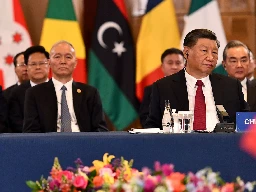
- One of the most direct ways that Beijing promotes authoritarian governance is through training programs for foreign government officials on Chinese governance practices. Beijing uses these sessions to directly promote ideas and practices that marry economics and politics to make a case for its authoritarian capitalism model.
- The training sessions also appear to serve intelligence-collection purposes by requiring each participant to submit reports detailing their prior exchanges and engagements with other foreign countries on specific training subjects, and it fits into China’s broader ambitions to undermine the liberal democratic norms.
- The reportis based upon 1,691 files from the Chinese Ministry of Commerce (MOFCOM) containing descriptions of 795 governmental training programs delivered (presumably online) in 2021 and 2022 during the pandemic. Beijing began delivering training programs in 1981, first in coordination with the United Nations Development Program (UNDP) as part of an effort to provide aid and basic skills to developing countries. In 1998, the Chinese government broke away from that cooperation arrangement and began offering its own centrally planned training programs directly to governmental officials from countries across the Global South.
- The trainings offer authoritarian principles in areas such as law enforcement, journalism, legal issues, space technologies, and many other topics. Given that in China, law enforcement is designed to protect the state and the Party rather than the people, journalism is prescribed to create national unity rather than act as a check against the system, and the law is intended to protect the regime rather than its citizenry, these training programs naturally offer foreign officials different lessons than they would receive from democratic countries.
- According to the report, the Chinese embassy in a country identified for training typically is notified roughly three months before a training program is expected to be hosted, and the Chinese embassy is tasked with selecting and inviting targeted individuals in the host country. For example, the Chinese Ministry of Public Security attaché at the embassy would be responsible for inviting local law-enforcement representatives to join programs organized by the Chinese Ministry of Public Security.
- Each training, no matter the subject, has contained language on CCP ideology and organization and related contributions to the PRC’s achievements in that subject area. In this way, authoritarian governance choices are being promoted even in the most niche of subject areas.
- Even programs on seemingly innocuous topics like beekeeping, bamboo forestry, meteorology, or low-carbon development all begin by briefing participants about the Chinese reform and guiding management principles raised at the latest plenary sessions of the Party committee.
- For the purpose of this research, the 795 training programs were reviewed and categorized into six groups based on their reported activities as outlined in the files:
> 1. Clearly authoritarian: The first group describes training programs which include explicit lessons on PRC practices that are widely regarded in liberal democracies as direct infringements on personal freedom. This includes PRC endorsement of non-democratic regime practices in political, government, and legal affairs, including administrative control over the media, information, and population.
>2. Potentially authoritarian: These training programs contain lessons on PRC practices which have, in some cases, infringed on personal freedom or indirectly aided infringement of personal freedoms and individual rights. This includes, for example, training on dual-purpose technologies that could be exploited to access individuals’ data in ways that expand state surveillance and control over citizens’ personal lives.
> 3. Infrastructure and resource access: These training programs are centered on setting standards and imparting industrial technical skills for various aspects of infrastructure and resource extraction, which may further PRC access to critical resources. This includes, for example, renewable energy application, mechanization of the agricultural sector, and technologies in mining, copper processing, and biotechnology.
> 4. Information operation access: These training programs are centered on activities that might further PRC access for its information operations, such as programs on Chinese culture and Mandarin-language promotion for foreign officials.
> 5. Security access: The fifth group involves and describes training programs centered on activities that may further PRC access to the sensitive security infrastructure of a foreign country, such as programs on aviation emergency, satellite imagery, and geochemical mapping.
> 6. Others: The sixth group includes all other training programs that do not fit into the above categories, such as pest control, climate change, soybean production, tourism development, and preschool-education sector capacity building.
Intelligence value of the trainings
As detailed in the files, the majority of these training programs, no matter the category, require participants to submit a report prior to the training. The trainings, therefore, provide a reliable intelligence benefit to the Chinese government. Even if an audience does not engage with the program content or demonstrate receptivity to party ideologies and narratives, the reports submitted by participants contain potentially valuable information that Beijing routinely receives en masse. Foreign officials are asked to write about current developments in their country related to the training subject, their country’s current cooperation and partnership with other countries on that subject, and potential ideas for collaboration with the PRC on that subject.
Beyond obtaining immediate, updated, and accurate intelligence from foreign government officials, this approach enables Beijing to assess their future willingness to cooperate on that subject. Specifically, the process directly identifies the scope of potential areas of cooperation from leading experts and officials in charge, prepares the way for potential informal discussion about future cooperation, and, most importantly, identifies individuals who are willing to facilitate and build long-lasting relations with China. With this in mind, this research effort focused on trainings aimed at expanding China’s footprint in the Global South’s infrastructure, resources, information operations, and security domains.
-
Norway’s Leader Ratchets Up Warnings on Chinese Threats
Norway’s prime minister signaled a hardening stance on China, pledging tighter cooperation with businesses on security risks linked to the Asian nation.
In his security policy statement to lawmakers in Oslo on Thursday, Jonas Gahr Store said China is the country “with the greatest capacity” for activity targeted at “undermining our interests and values.” While the premier highlighted the threats from neighboring Russia following its full-scale invasion of Ukraine, he said Norwegians must pay more attention to risks when collaborating with China.
“Going forward, risk reduction will have to be part of our approach to China and Chinese actors,” Store said. “We want cooperation with China, in trade, climate, the green shift - to solve global problems. But it is not advisable in sensitive areas.”
The Norwegian government has so far struck a more cautious tone on China than many of its European counterparts, even as the country’s intelligence agencies have repeatedly warned about risks posed by China, including influence efforts focused on the Arctic.
Norway also harbors painful memories of China suspending ties with the Nordic nation for most of last decade after the Norwegian Nobel Committee awarded human rights advocate Liu Xiaobo the Nobel Peace Prize in 2010 for “his long and non-violent struggle for fundamental human rights in China.”
“We are now intensifying the dialogue with the business world, the knowledge sector and other social actors, about risks linked to cooperation with China and other countries,” Store said.
-
China's government launched additional "local communication centers" to increase propaganda efforts worldwide
chinamediaproject.org More Local Centers for Global Propaganda - China Media ProjectThe addition of external propaganda bases in Zhejiang and Tianjin over the past two weeks brings the total number at the provincial level to 23. These ICCs, also being launched at the city level, are meant to remake China's approach to delivering its message externally.
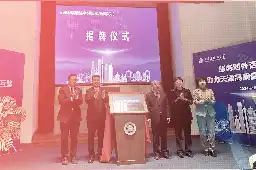
The addition of external propaganda bases in Zhejiang and Tianjin over the past two weeks brings the total number at the provincial level to 23. These International Communication Centers (ICCs), also being launched at the city level, are meant to remake China’s approach to delivering its message externally.
On June 7, the municipality of Tianjin became the latest provincial-level jurisdiction in China to launch a central office for disseminating foreign propaganda. According to coverage in Tianjin’s flagship CCP-run newspaper, the Tianjin Daily, the center will focus on television, radio and multimedia products for foreign distribution, as well as “major international events,” all to “present a true, multidimensional, and lively image of Tianjin.”
The formation of the Tianjin ICC follows closely on the heels of the set up on May 31 of Zhejiang International Communication Center (浙江国际传播中心), or ZICC. A release from provincial media in Zhejiang called ZICC “an all-in-one communication platform.” The center, which consolidates state media resources at the provincial-level, comprises websites, dedicated news channels, and an “overseas social media platform account matrix” with a total follower base of over 8 million.
With the addition of the Tianjin and Zhejiang centers, the number of provincial-level ICCs in China now stands at 23.
> Over the past two years, responding to instructions from the central CCP leadership, local "international communication centers" have been established in 27 provinces.
China’s provincial and city-level international communication centers, or ICCs, are spearheading efforts promoted by the leadership since 2018, and accelerating over the past two years, to “innovate” foreign-directed propaganda under a new province-focused strategy. In June 2023, provincial and city-level ICCs in China created a mutual association to better coordinate work nationwide. The process of integrating the ICCs both horizontally and vertically, including with central state media, has begun to emerge as a core strategy in the CCP’s remaking of its overall propaganda matrix.
[Slightly changed the headline for better clarity.]
-
Chinese #MeToo journalist jailed for five years
www.bbc.com Huang Xueqin: Chinese #MeToo journalist jailed for five yearsSophia Huang Xueqin had been one of the main #MeToo voices in China when she was arrested in 2021.
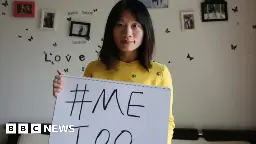
A prominent female #MeToo activist in China has been handed a five-year jail sentence for "subversion against the state".
Sophia Huang Xueqin was convicted and sentenced on Friday, nearly 10 months after she went on trial.
Labour activist Wang Jianbing, who stood trial with Ms Huang, was sentenced to three years and six months in prison.
Ms Huang, 36, had been one of the most prominent voices in China's #MeToo space, reporting ground-breaking stories about sexual abuse victims.
She had also spoken out about the misogyny and sexism she faced in Chinese newsrooms.
Chinese authorities have not made it clear how the two stood accused of subversion. The trial was a closed-door hearing.
But their supporters say they were detained because they hosted regular meetings and forums for young people to discuss social issues.
Ms Huang had been on her way to take up a UK-government sponsored masters scholarship at the University of Sussex when she was detained at the airport in the city of Guangzhou in 2021.
Mr Wang, 40, was with her at that time.
Supporters say both have endured months of solitary confinement during their pre-detention custody, which lasted for nearly 1,000 days. Their trial only began in September 2023.
A BBC Eye investigation in 2022 found that both were being held in solitary confinement, detained in secret locations known as 'black jails'.
In 2021, amid Covid lockdowns and growing public anger, Chinese authorities launched a crackdown on several activists working across different fields.
"Their efforts and dedication to labour, women's rights, and the broader civil society won't be negated by this unjust trial, nor will society forget their contributions," said the campaign group Free Huang Xueqin and Wang Jianbing.
"On the contrary, as oppression persists and injustice grows, more activists like them will continue to rise."
Amnesty International on Friday called the convictions "malicious and totally groundless".
"[They] show just how terrified the Chinese government is of the emerging wave of activists who dare to speak out to protect the rights of others," said Amnesty International’s China Director Sarah Brooks.
"#MeToo activism has empowered survivors of sexual violence around the world, but in this case, the Chinese authorities have sought to do the exact opposite by stamping it out."
It is unclear if the time already served by the pair will go towards reducing their sentence.
Public reaction to Ms Huang's trial has previously been mixed - with some online decrying the case while others critical of the feminist movement welcomed it.
Many advocates for gender rights and social causes in China choose to remain anonymous online.
Often they have been accused of being "agents of hostile western forces" by state media and nationalists on the internet.
-
Drowned Homes, Broken Lives: How Tibet’s Tofu Dams Build China’s Green Tyranny -- (Opinion)
A multipolar world populated by green power centers from the global south is what China advocates on the international stage. Why, then, is its dam-building in Tibet aimed to completely the opposite effect?
Tibet is often described as the world’s third pole, a land of rising mountains, vertiginous valleys, sliding glaciers and once free-flowing rivers, where outstanding biodiversity and geological complexity furnish humankind with a treasure trove of natural and spiritual richness.
Bordering India and China, it straddles the headwaters for culturally and economically vital rivers that flow through both heavyweights, not to mention the Indo-Chinese Peninsula. Its mineral riches are as replete as the pharmaceutical possibilities implied by its numerous world-unique plant species.
These features ought to combine to establish a regional power innately endowed with wealth and clout, one that, with its pastoralist heritage of stewardship towards the natural world, could perhaps suggest a less intrusive and exploitative pathway to development if it was accorded the right to democratic self-determination.
Yet, as described in a report released in May by Turquoise Roof, a collective of Tibet-focused specialists, scholars and analysts, these strengths are being usurped and partially destroyed by the Chinese government, which, having invaded and occupied Tibet since 1950, is aggressively arrogating its resources in order to enmesh the country within itself and render the energy economy of the future dependent on its whims.
Titled “Occupying Tibet’s rivers: China’s hydropower ‘battlefield’ in Tibet,” the report takes as its starting point the recent protests in the Derge area of Kardze in the Tibetan region of Kham, which is currently administered as part of Sichuan Province. In February of this year, Derge broke out into protest over plans to evict families and monks from 12 villages and six monasteries to make way for one section of a dam cascade upstream on the Yangtze River, where it is known as the Jinsha to Mandarin-speakers or the Drichu to Tibetans.
Even though protesters donned the Chinese flag to emphasize that their actions were not aimed at “splittism,” the lowest of crimes in Beijing’s eyes, and religious leaders prostrated themselves in front of Chinese Communist Party officials, their pleas for their homes and heritage resulted in hundreds of arrests, beatings in custody and a paramilitary-style lockdown that apparently continues to the present moment.
Turquoise Roof places this ongoing incident against the backdrop of China’s wider plans to transform Tibet into a literal battery and generator by ramming vast hydropower installations into mountain valleys and bundling them together with solar and wind technologies, irrespective of the social, cultural and ecological cost.
Constructed under the umbrella of the state-owned coal conglomerate China Huadian Corporation, which has just signed a cooperation deal with Siemens, Derge’s Gangtuo Dam, as the 1.1. million-kilowatt hydropower station is called in Mandarin, will merely be one of 13 that are set to transform formerly unadulterated upper reaches of the Yangtze into something like a series of stepped reservoirs with “captive water levels high enough to lap at the bottom of the dam wall of the next dam upriver.”
Alongside more hydropower that China is locating on other major rivers of Tibet, numerous dangers are foreseen. Environmental concerns range from the disruption of a major migratory bird route and wetlands of international importance covered by the Ramsar Convention to the exorbitant release of greenhouse gasses that are required to form and transport materials for the colossal dam walls. Livelihoods from fisheries may be compromised, an outcome that is already attested in scientific literature for both the Yangtze and the Mekong in relation to the existing artificial segmentation of their waterways downstream.
On the other hand, because more suitable locations for construction have already been exploited, Tibetan dams are now being erected on thick silt beds in a seismically active region where mountains are still rising, rivers still cutting into them. As a result, they are said to be structurally akin to tofu, a metaphor that was made famous during the devastating 2008 Sichuan earthquake. According to some hypotheses, that disaster, which killed at least 90,000 people, may have been triggered by the filling of a large, nearby reservoir, and Turquoise Roof argues that something similar could ensue again alongside other dam-induced geological catastrophes in Tibet.
To make way for these dangers, thousands upon thousands of people are being coercively relocated from their homelands to new government-designated residences where they frequently lack the opportunities or skills to adapt. Food insecurity and malnutrition are wolves at the door due to the resettlement of farmers and nomads, who once produced nourishment for themselves and their families.
Thus, Tibet may be looking not just at a cascade of potential dams, but a cascade of potential dam failures visited upon a local population that is already struggling to make ends meet, and, if that sounds fanciful, it is worth remembering that hydropower facilities built by China’s state-owned companies have not always maintained the highest standards for construction and assessment of impact.
Infrastructure has proven defective in Ecuador, Uganda and Guangxi, where a recent dam failure went unreported by domestic media. As pointed out by Turquoise Roof, Tibet has already suffered a major disaster associated with the establishment of a massive dam known as Lawa Batang, too. And, going back to the previous century, the 1975 collapse of the Banqiao Dam in Henan Province led to the loss of more than 150,000 lives.
So why is China pursuing such risky plans despite the engineering fallibilities and cultural destruction that could result? Partly, the subsummation of rural homes and spiritual centers like the fresco-filled, 13th century Wontoe Monastery can be read as another round in China’s long-term attempts to assimilate Tibetans, a policy that is often justified in ecological or poverty alleviation terms, but which is better understood as breaking up Tibetan communities, leaving them disconnected from their heritage and dependent on the Han state.
However, with renewable energy, other motivations are coming to the fore. The rivers of the Tibetan plateau sit upstream from well over a billion people, conferring significant power on anybody who can conquer their flow. The electricity generated by Tibetan dams can meanwhile be routed to nearby mines, where local reserves of minerals like copper and lithium are extracted in often environmentally calamitous conditions to service the battery, electric vehicle and other industries. It is also sent eastwards to feed China’s factory heartlands.
Hence, the discrepancy between what the Chinese leadership practices and propounds is exposed. While it claims to support a multilateral world in which less affluent countries and peoples are freed from Western domination to fulfill their own developmental destinies, it is determinedly chaining the fate of Tibet to itself in an effort to render any concept of its future independence meaningless.
At the same time, it is establishing ownership of Tibetan lands that confer strategic power over the wider region and exploiting the specific natural features of these lands in order to generate the energy required to rob them of their mineral resources. Then, both the energy and the extracted minerals are supplied to Chinese companies, who, under the direction of the state, can produce a cheap flood of products in the green- and high-tech industries, decimating competitors elsewhere in the world and concentrating yet more wealth and influence in Beijing’s clutches.
An independent Tibet that made its own decisions about its rivers and resources would necessarily temper these hegemonic designs. That is why, in the eyes of the Chinese Communist Party, it can never be allowed to occur.
-
China’s credit engine, which once powered industries and markets all over the world, is stuck in low gear – and set to stay there
Data for May due this week is forecast to show a resumption of loan growth after a shock contraction in April, the first for almost two decades. But nobody expects a return to the days when Beijing would engineer borrowing booms to speed up the world’s second-biggest economy.
Especially since the 2008 crash, China has pumped out credit to build homes and infrastructure, which kept the economy humming. Now it’s stuck in a housing slump and already has plenty of roads and high-speed rail. Policymakers are seeking new ways to sustain growth — like high-tech manufacturing — that won’t rely so much on expanding debt.
China's Loan, Credit Growth Keeps Slowing Amid Weak Demand
The People’s Bank of China has repeatedly signaled it has no intention of revving up the lending engine again. Even if it wanted to, there’s little demand for credit. Government bond sales picked up last month, but the real estate crisis has left Chinese households and businesses reluctant to finance spending or investment by taking on new debts.
“Household savings that used to go into property are now going into the financial system, but there aren’t enough borrowers on the other side,” said Adam Wolfe, an emerging-market economist at Absolute Strategy Research. The PBOC is “trying to create a new normal for credit growth,” he said.
If that effort succeeds, Chinese debt may lose its status as a strong leading indicator for the country’s business cycle — and hence for global commodity markets.
To see how that’s worked over the past 15 years or so, one useful guide is the credit impulse, which measures the ratio of new debt to gross domestic product. It shows four distinct spurts of stimulus since 2009.
China's Credit Cycle Fails to Pick Up Again
As recently as early 2021, China was building its way out of the pandemic in a credit-fueled construction boom that sucked in raw materials from across the planet and helped drive a broad commodity rally.
Around that time, Federal Reserve researchers concluded that China’s credit policies explained more than one-fifth of all commodity-price movements since the global financial crisis. In a separate study, they estimated that when China’s credit impulse rose by 1% of GDP, it delivered a matching boost to global trade – and a 2.2% increase in commodity prices – as well as lifting the Chinese economy.
But since 2022 the credit impulse has essentially flatlined.
“The credit growth data is still a reference to gauge Chinese industrial activities, but it’s a less-strong indicator now,” said Li Xuezhi, head of Chaos Ternary Research Institute, a commodity analysis firm. The economy used to be led by property and infrastructure investments, but the “new quality productive forces” that Beijing is now backing involve other forms of financing like venture capital, Li said.
The lending slowdown is spurring debate over various alarming scenarios for China’s economy. One is a “liquidity trap,” where lower borrowing costs are unable to stimulate growth. Another is a “balance sheet recession,” where households and companies are focused on clearing debts rather than spending.
As China seeks a growth model based on improving productivity instead of expanding debt, the PBOC’s priority is to make sure existing funds are used more efficiently, according to Wolfe. To the extent it succeeds, “the relationship between aggregate credit and the industrial cycle should break down,” and there are signs that it already is, he said.
Authorities took steps in recent years to rein in over-indebted real estate developers and clean up so-called hidden debt owed by local governments, which doesn’t appear on their balance sheets. Property and local government financing vehicles accounted for about 70% of new credit generated over the past decade, according to an estimate by Zhang Bin, a researcher with the Chinese Academy of Social Sciences.
The PBOC is also trying to make sure credit is reaching the real economy, instead of idling within the financial system. Authorities have cracked down on loopholes that allowed companies to make fake loans, arbitraging between higher deposit rates and cheaper borrowing.
An era when loan growth was seen as a key benchmark, by investors and policymakers alike, has left banks with incentives to plump up their numbers.
A case in point is the short-term interbank loans known as bankers’ acceptances. Their cost fell to the lowest level this year in May, according to data from Zhongtai Securities Co. That’s usually a sign that lenders are swapping bills with each other to boost loans
because they’re struggling to find companies that want to borrow.
Even if such techniques help to boost the loan figures coming this week, investors won’t be impressed and will look deeper, said Mary Xia, research director at Beijing Jifeng Asset Management Co.
“The market understands that the weak credit growth is due to problems on the demand side,” she said.
- www.theguardian.com China’s maritime militia: the shadowy armada whose existence Beijing rarely acknowledges
They look like simple fishing boats but are capable of swarming in huge numbers to help Beijing stake its territorial claims in the South China Sea

They look like simple fishing boats but are capable of swarming in huge numbers to help Beijing stake its territorial claims in the South China Sea
Chinese fishing boats started swarming the Scarborough Shoal in the South China Sea in mid May. Some had already been drifting around the picturesque reef in the Philippines exclusive economic zone for some time.
However, the Chinese boats were not regular fishing vessels, and they weren’t there to fish. They were there to counter a Philippine aid flotilla aiming to deliver supplies to fishers near the disputed shoal. In the end, the aid flotilla turned back before it reached the shoal.
The Chinese vessels were part of a maritime militia, a shadowy armada whose existence Beijing rarely acknowledges and that it has long used to help hold or take disputed territory it says it owns in the region.
The militia has a long history in the area. Its key role in seizing Scarborough Shoal in 2012 set off one of the most high-profile territorial disputes in the South China Sea.
The shoal is just one of a range of sites that have seen dangerous clashes between China and other competing claimant nations. The tensions have escalated to make the South China Sea a potential flashpoint in one of the most strategically and economically important waterways in the world.
What is the maritime militia?
The maritime militia has existed for decades but has become more professional, better equipped, and more militarised under the leadership of President Xi Jinping, who has overhauled China’s armed forces since taking power in 2012.
It is made up of two main forces. One is the professional fleet of at least 100 purpose-built boats which have the appearance of fishing vessels. The other fleet, known as the Spratly Backbone Fishing Vessels (SBFV), is a larger group of actual fishing boats that operate out of ports across Hainan and Guangdong, and have been drafted into China’s missions.
The professional fleet consists of stronger boats with better, often military-grade equipment. They’re usually visible on satellite tracking platforms swarming around disputed locations.
The SBFV is harder to spot, and usually have lower grade satellite transmitters or none at all. Some have had structural and technological upgrades.
Crews in both fleets are believed to be civilian fishers and sailors as well as ex-military personnel recruited through a Chinese government training program. The vessels tend to have a smaller crew of about five to six if engaging in militia activities as opposed to genuine trawling, according to South China Sea expert Greg Poling, director of the Asia Maritime Transparency Initiative (AMTI).
How are they funded?
Militia are primarily funded through various government subsidies, and some personnel receive full-time salaries from state-owned companies, according to the AMTI. The SBFV crews also receive lucrative government fuel subsidies for militia missions, an income that disincentivises them fishing.
"These [crews] could fish if they wanted to, and occasionally they do, but mostly they sit quietly and then raft together [at disputed locations],” says Ray Powell, director of SeaLight, a maritime transparency project at Stanford University. “It’s most economical to just sit there and not use the fuel.”
A 2021 investigative report by the AMTI said there was “no longer any question about whether the militia is organised, funded and directed by the government of China”. It said Beijing was legally responsible for the militia’s actions, which “violate several tenets of international law”. The Chinese government rarely acknowledges the militia’s activities, or that they are anything other than fishing boats operating in what they say are traditional Chinese waters.
Beijing defends its operations in places like the Scarborough Shoal as acts of “rights protections”, but rarely concedes that the militia is part of it. It acknowledges the existence of the militia, but is “cagey” about what boats are actually in it, says Powell.
Employment contracts and state media articles reveal explicit directions from officials regarding their “political responsibilities” to operate in particular areas, and support the military when required. Towns that develop professional militia fleets have received government accolades and even visits from Xi for their efforts.
How does it operate?
The militia operates across the region, including the Yellow Sea and in the exclusive economic zones of Indonesia, Vietnam and Malaysia, but right now observers are focusing on activity in the South China Sea, where the brinkmanship is escalating, especially with the Philippines.
The fleets conduct intrusive journeys through foreign exclusive economic zones, blockade disputed reefs and islands, and have repeatedly rammed or used water cannon on other vessels in dangerous manoeuvres, including against the US Navy. Militia boats will often raft together to create a risk of collision and impede access, or camp out at a reef for months, strengthening China’s physical presence in a region where that presence is key to controlling a site.
Statements from Chinese officials suggest the professional fleet is called on first for more aggressive operations.
“The professional fleet is a direct threat, but smaller. The [SBFV] fleet is larger but a nuisance. They just drop anchor,” says Poling. “Governments have to treat them in different ways. One is a military threat, and one as a pain in the neck, which is a law enforcement problem.”
What have other countries said about it?
World governments and bodies have repeatedly condemned China’s behaviour in the South China Sea, including operations involving the maritime militia.
The US, which is a treaty ally of the Philippines, has repeatedly accused the militia of violating international law “to enforce its expansive and unlawful maritime claims”.
The Philippines, which is the target of most recent militia activity, says it “will not be deterred from pursuing legitimate and lawful activities in our maritime zones”.
Poling says the Philippines is pushing back more than it used to.“On the Philippines side they don’t see any other option,” he said.
It hasn’t really responded to the regional resistance, Poling says, and is instead “pushing the Philippines and other neighbours to form anti-China coalitions”.
“China was willing to do crazy stuff and everyone backed down [in the past]. But now they’re not, and like a school bully China doesn’t know what to do now.”
-
China solar panel manufacturers seek government action to halt freefall in prices as overcapacity takes hit
Chinese solar panel manufacturers said they are seeking immediate government intervention to curb investment and industry collaboration to arrest a plunge in prices of solar cells and modules, as the industry faces overcapacity.
Financial incentives and a government push have helped China become the solar panel factory of the world, accounting for about 80% of global module capacity. Analysts expect Chinese manufacturers to add up to 600 gigawatts (GW) this year, enough to meet global demand through 2032.
However, with no end in sight for the plunge in prices, industry officials and analysts said intense competition was threatening to drive smaller producers into bankruptcy. Rapid capacity additions drove down prices of China's finished solar panels by 42% last year.
"Survive - that's the goal," Li Gang, chairman of Seraphim Energy Group said at the International Solar Photovoltaic and Smart Energy conference on Tuesday.
Between June 2023 and February 2024, at least eight companies cancelled or suspended more than 59 GW of new production capacity, equivalent to 6.9% of China's total finished panel production capacity in 2023, according to the China Photovoltaic Industry Association (CPIA).
"We need to join our forces together to avoid overinvestment," Gao Jifan, chairman and CEO of Trina Solar and honorary president of CPIA told the conference.
Gao sought government regulation of new investment in the sector to plug further losses, while SiNeng Electric's president Duan Yuhe asked the Chinese state planner to intervene.
Gongshan Zhu, chair of the Asian Photovoltaic Industry Association, warned new companies against rushing into the sector, saying industry profits had plunged 70% due to overcapacity and falling prices, while exports were curbed by trade barriers imposed by the United States.
"If you're just a copycat, it will not be sustainable for you," Zhu said, adding that the situation has been exacerbated by local governments investing for the sake of boosting employment.
Industry executives speaking at the conference also called for an end to race-to-the-bottom price competition, and suggested bidding processes take into account levels of research and development, instead of just pricing.
Some company officials, such as Wuxi Suntech Power Chairman Fei Wu, said consolidation had already begun. The industry's prospects were expected to worsen this year and more small companies were likely to go out of business, he added.
- arstechnica.com China state hackers infected 20,000 Fortinet VPNs, Dutch spy service says
Critical code-execution flaw was under exploitation 2 months before company disclosed it.

- Hackers working for the Chinese government gained access to more than 20,000 VPN appliances sold by Fortinet using a critical vulnerability that the company failed to disclose for two weeks after fixing it, Netherlands government officials said.
- The Netherlands officials first reported in February that Chinese state hackers had exploited CVE-2022-42475 to install an advanced and stealthy backdoor tracked as CoatHanger on Fortigate appliances inside the Dutch Ministry of Defense.
- Chinese state hackers have used the critical vulnerability to infect more than 20,000 FortiGate VPN appliances sold by Fortinet. Targets include dozens of Western government agencies, international organizations, and companies within the defense industry.--
The vulnerability, tracked as CVE-2022-42475, is a heap-based buffer overflow that allows hackers to remotely execute malicious code. It carries a severity rating of 9.8 out of 10. A maker of network security software, Fortinet silently fixed the vulnerability on November 28, 2022, but failed to mention the threat until December 12 of that year, when the company said it became aware of an “instance where this vulnerability was exploited in the wild.” On January 11, 2023—more than six weeks after the vulnerability was fixed—Fortinet warned a threat actor was exploiting it to infect government and government-related organizations with advanced custom-made malware.
Enter CoatHanger
The Netherlands officials first reported in February that Chinese state hackers had exploited CVE-2022-42475 to install an advanced and stealthy backdoor tracked as CoatHanger on Fortigate appliances inside the Dutch Ministry of Defense. Once installed, the never-before-seen malware, specifically designed for the underlying FortiOS operating system, was able to permanently reside on devices even when rebooted or receiving a firmware update. CoatHanger could also escape traditional detection measures, the officials warned. The damage resulting from the breach was limited, however, because infections were contained inside a segment reserved for non-classified uses.
On Monday, officials with the Military Intelligence and Security Service (MIVD) and the General Intelligence and Security Service in the Netherlands said that to date, Chinese state hackers have used the critical vulnerability to infect more than 20,000 FortiGate VPN appliances sold by Fortinet. Targets include dozens of Western government agencies, international organizations, and companies within the defense industry.
"Since then, the MIVD has conducted further investigation and has shown that the Chinese cyber espionage campaign appears to be much more extensive than previously known,” Netherlands officials with the National Cyber Security Center wrote. “The NCSC therefore calls for extra attention to this campaign and the abuse of vulnerabilities in edge devices.”
Monday’s report said that exploitation of the vulnerability started two months before Fortinet first disclosed it and that 14,000 servers were backdoored during this zero-day period. The officials warned that the Chinese threat group likely still has access to many victims because CoatHanger is so hard to detect and remove.
Netherlands government officials wrote in Monday’s report:
> Since the publication in February, the MIVD has continued to investigate the broader Chinese cyber espionage campaign. This revealed that the state actor gained access to at least 20,000 FortiGate systems worldwide within a few months in both 2022 and 2023 through the vulnerability with the identifier CVE-2022-42475 . Furthermore, research shows that the state actor behind this campaign was already aware of this vulnerability in FortiGate systems at least two months before Fortinet announced the vulnerability. During this so-called 'zero-day' period, the actor alone infected 14,000 devices. Targets include dozens of (Western) governments, international organizations and a large number of companies within the defense industry.
> The state actor installed malware at relevant targets at a later date. This gave the state actor permanent access to the systems. Even if a victim installs security updates from FortiGate, the state actor continues to have this access.
> It is not known how many victims actually have malware installed. The Dutch intelligence services and the NCSC consider it likely that the state actor could potentially expand its access to hundreds of victims worldwide and carry out additional actions such as stealing data.
> Even with the technical report on the COATHANGER malware, infections from the actor are difficult to identify and remove. The NCSC and the Dutch intelligence services therefore state that it is likely that the state actor still has access to systems of a significant number of victims.
Fortinet’s failure to timely disclose is particularly acute given the severity of the vulnerability. Disclosures are crucial because they help users prioritize the installation of patches. When a new version fixes minor bugs, many organizations often wait to install it. When it fixes a vulnerability with a 9.8 severity rating, they’re much more likely to expedite the update process. Given the vulnerability was being exploited even before Fortinet fixed it, the disclosure likely wouldn't have prevented all of the infections, but it stands to reason it could have stopped some.
Fortinet officials have never explained why they didn’t disclose the critical vulnerability when it was fixed. They have also declined to disclose what the company policy is for the disclosure of security vulnerabilities. Company representatives didn’t immediately respond to an email seeking comment for this post.
